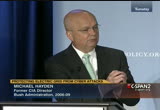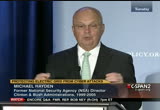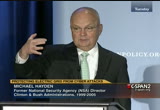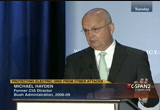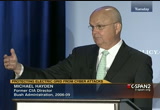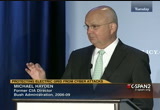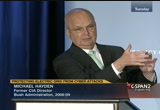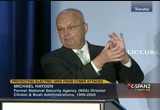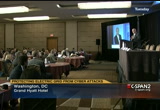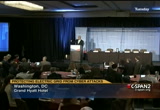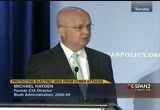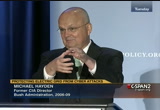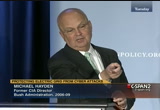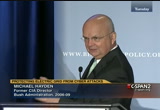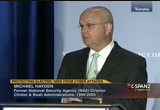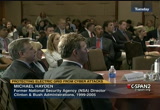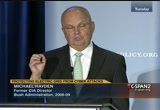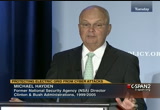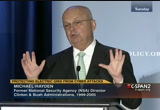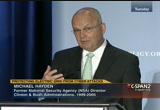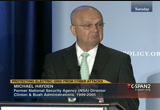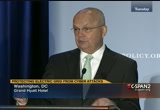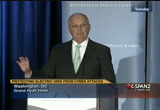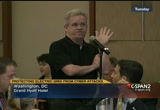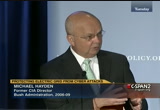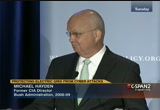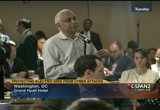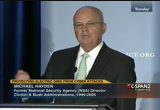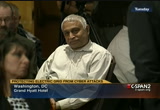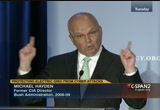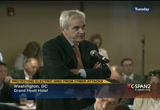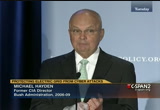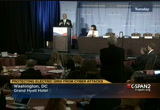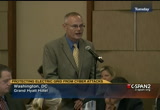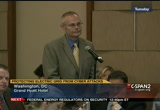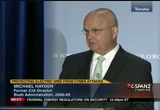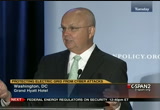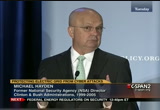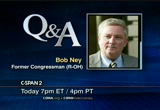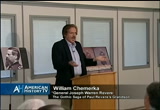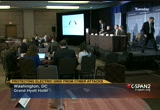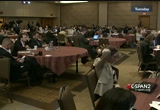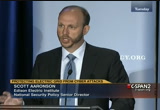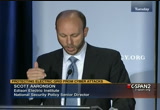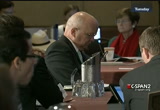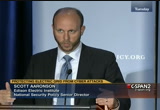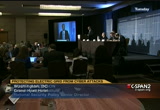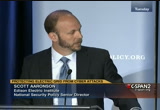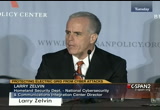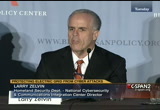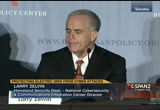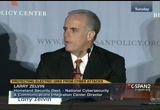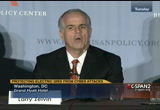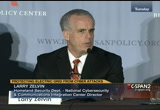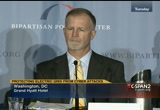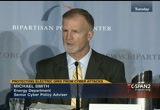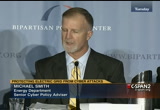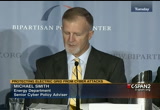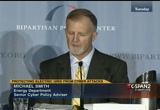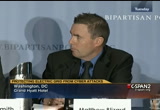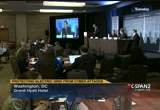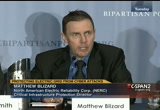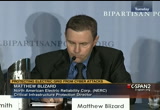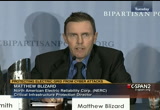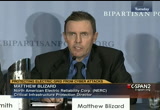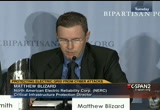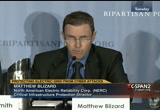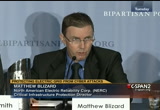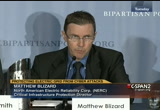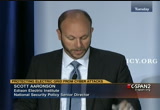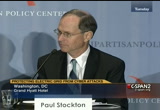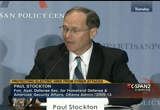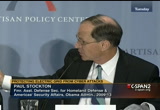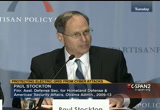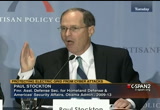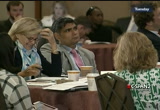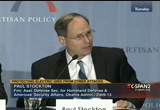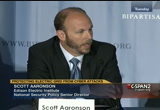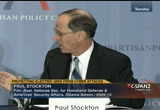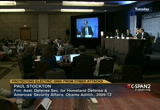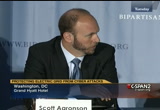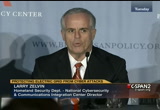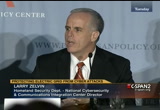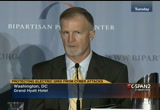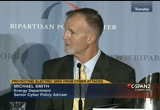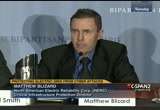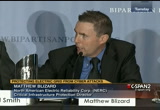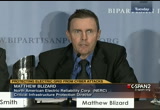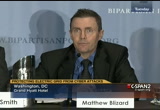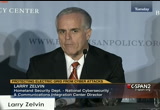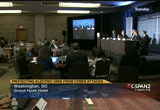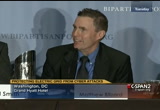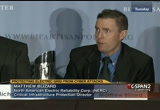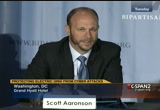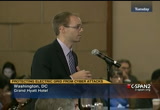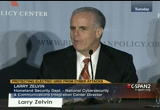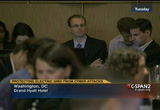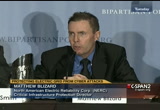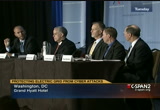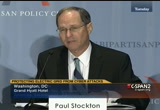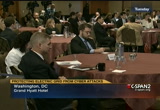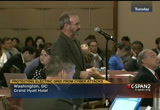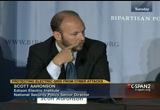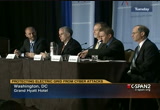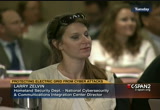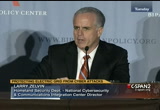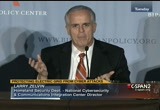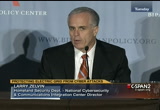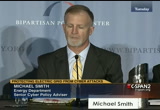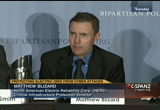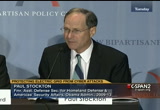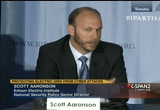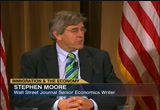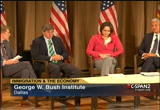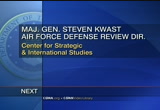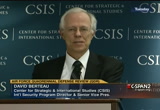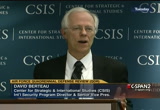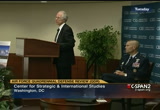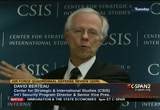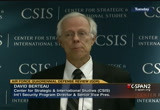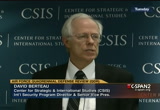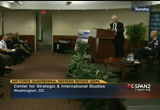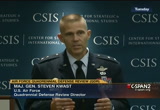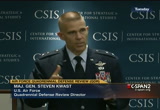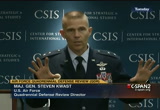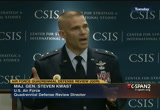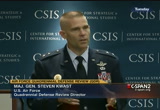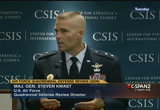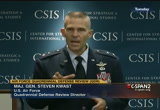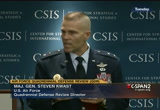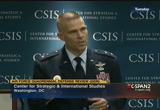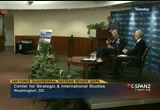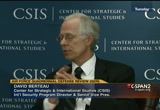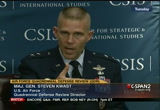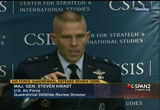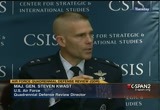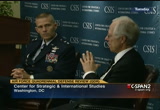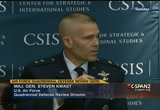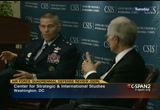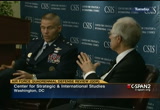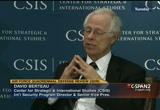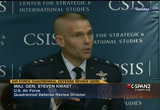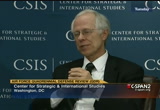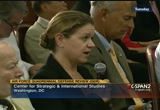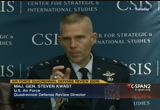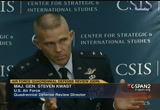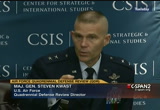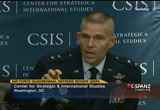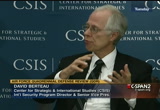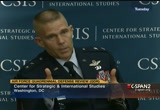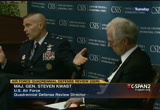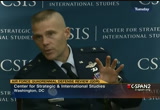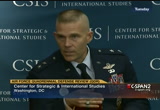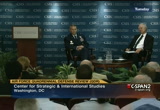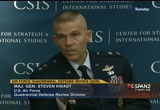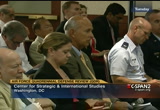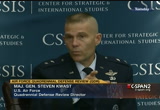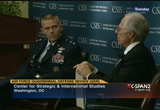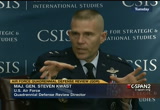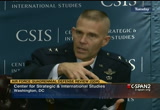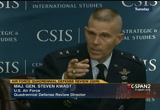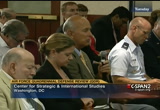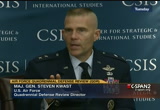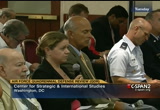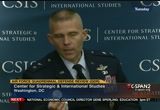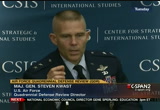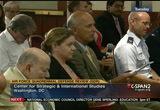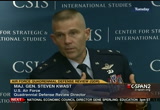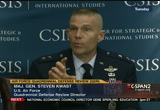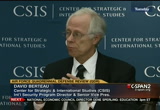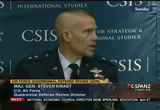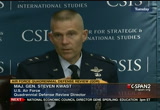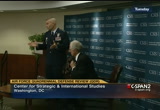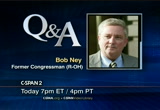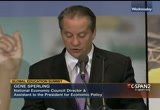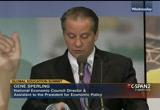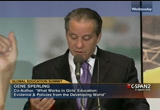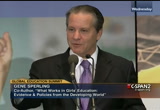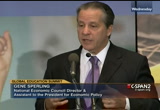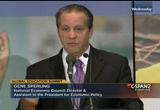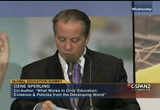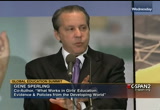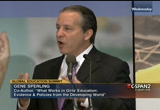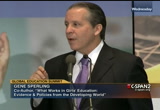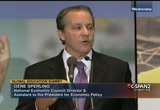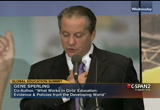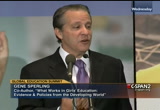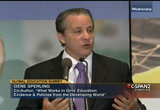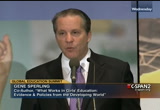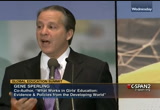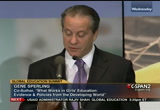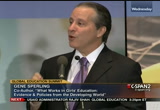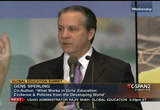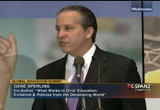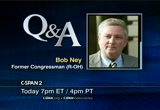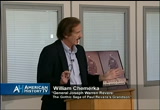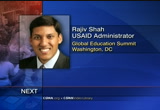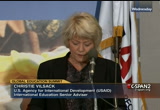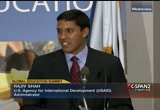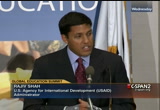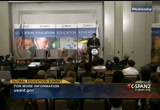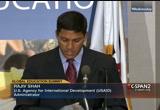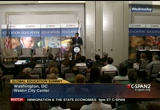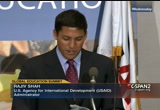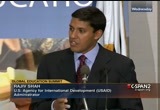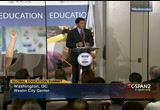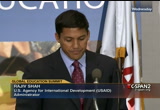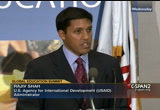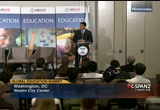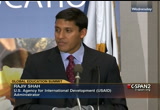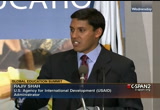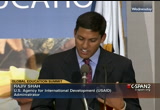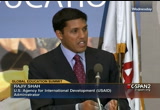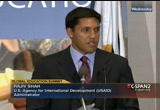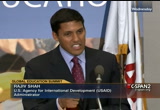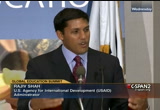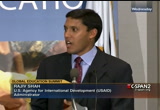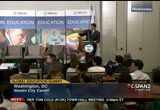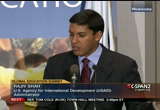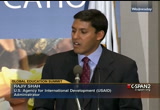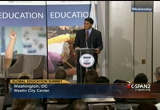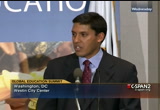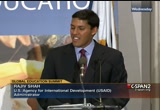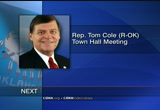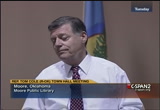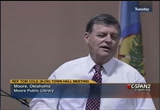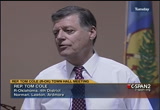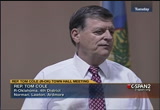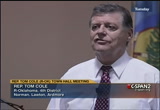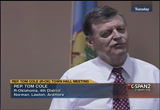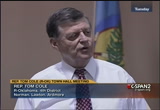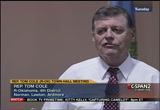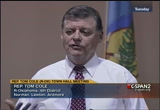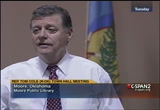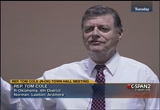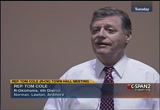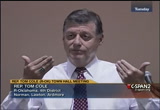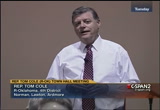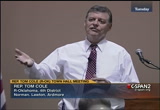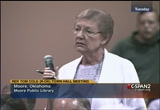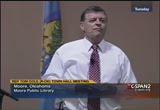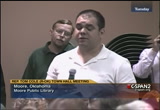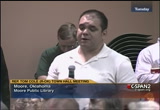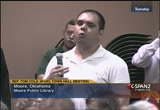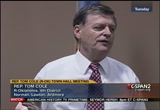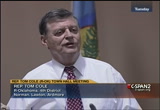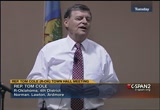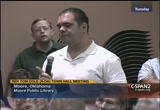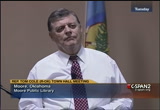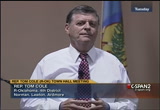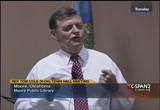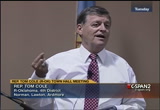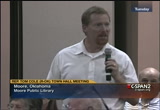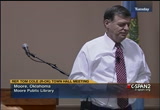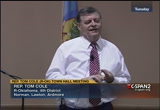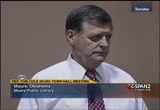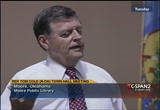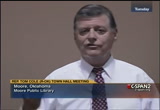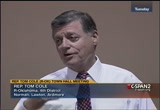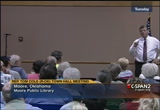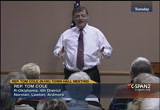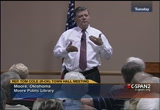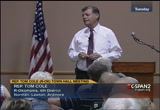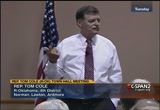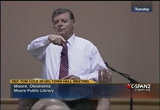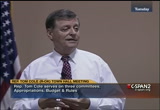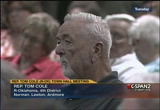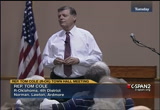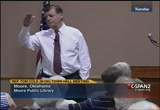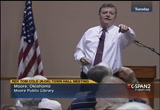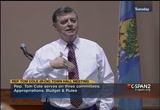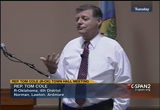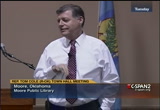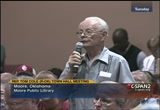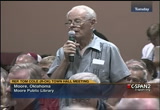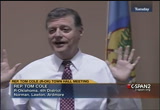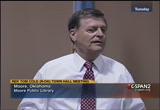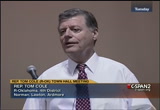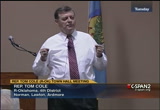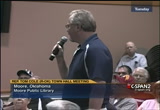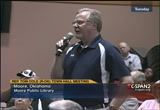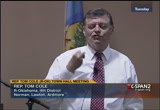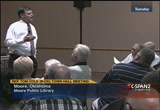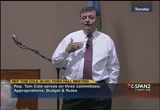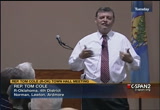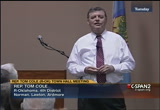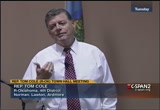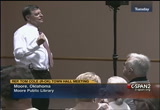tv U.S. Senate CSPAN August 8, 2013 12:00pm-5:01pm EDT
12:00 pm
the second layer, and it's becoming more active is not just stealing your stuff, all right, it's disrupting your network. i will throw out an example, estonia 2007 can remember page or a russian hackers crashing the estonia internet system because they were mad they were moving in a moral to the red army out to the suburbs. think patriotic russian hackers 2008, invasion of georgia bringing the georgian net to its knees. a net in which the georgian government were using for command and control. more current, more problematic, more personal for you and me, shamoon, a virus, saudi aramco, 35,000 hard drives, wiped clean. pick your enterprise ca, imagine yourself going back home where ever it is you work and imagine tomorrow 35,000 hard drives being wiped clean. you get the picture. and, frankly, although our government hasn't quite
12:01 pm
announced a kid, i think you and i know that's the iranians. and the iranians apparently some of you offended in the cyber domain we'll get to that in a minute, has been attacking american banks with massive distributed servers attacks. serial attacks against bank of america, wells fargo, jpmorgan chase. the list goes on. i tal talked to one officer whod on a normal weekday you and i hit their website about 15,000 times a minute to cash a check or move our money. they are getting 3 billion hits a minute at the height of the iranian attacks. so a lot more disruption. they're stealing your stuff, disrupting your network, and then finally using this domain up here to trade affects not confined to my thumb, but treating affects down here. and the most dramatic example of that, of course, is stuxnet which detroit about 1000 centrifuges. stuxnet almost what i conducted
12:02 pm
by a nationstate because it's too complicated to be done in a garage or in your basement, all right? look, given my background, former director of cia, i think it's absolute unavoidable good. but i'll describe what i just described to you in just like they did forward. somewhat almost certain initiative during a time of these just use a cyber weapon to destroy another nation's critical infrastructure. ouch. that's a big deal. you may or may not see me making a comment on 60 mins about a year and a half ago in which i can characterize that as somebody crossing a river gone, got a leaking on the other side of the river, and life will be very different. so those are your sins. stealing your stuff, disrupting the network, destroying their infrastructure. who are the sinners? nationstates. you know that. criminal elements, and then finally this third group that it would have trouble defining,
12:03 pm
nihilists, anarchists, activists, losec, anonymous, twentysomethings, talking to the opposite sex in five or six years. [laughter] the capacity to do harm is pretty much the way -- governments are by far most confident. criminal gangs, the next layer, then you have this script here and that's kind of good because as bad as governance could be sooner or later governments can be held to account. you've got criminal elements and they could be pretty dangerous and they're kind of -- but fundamentally criminals want to make money. and enter into a symbiotic relation with whatever their target is. and it's a strange creature, strange parasite in nature who ended into a semiotic ladyship with a host that they want to
12:04 pm
kill or destroy. and something even criminals are somewhat limited. what worries me is this gang down here. right now they are a staple what you know better than i that the tides come in and all the boats in the harbor are going up. and so this group is beginning to acquire capacities that may be a year or two or three ago, we waited only with some of the more confident, more capable groups. in other words, as time goes on we will see this group down here whose demands are hard to define, his demands maybe unsatisfiable, okay? beginning to acquire the capacity that we now associate with nationstates. let me drill this down to something very, very specific. if and when our government grants edward snowden and brings them back into the united states for trial, what does this group do? they may want to come after the
12:05 pm
u.s. government, but, frankly, the dot mil stuff is about the hardest step in the trendy. they can't create great harm to dot mil, whether going after? who for them are the world trade centers? the world trade centers as they were for al qaeda. so i guess what i'm suggesting is this is, this will get worse before it gets better. and i mentioned it being very hard up here. let me give a couple reasons what is really hard for us to defend ourselves of you. not -- neville and, -- number one, talk about intelligence and operations for a minute. there with me, there's i think a very relevant point. down here in these domains, where, frankly i conducted intelligence for most of my career, okay, intelligence is what you do before the operation. you've got to know your enemy
12:06 pm
before you conduct an operation against your enemy. it's sequential. intel first, operations next. i would also suggest to you that as hard as intelligence was sometimes, intelligence almost always, this is pretty close to universal role, intelligence gathering almost always was easier than the actual operation you are going to try to perform eventually. i'll just throw out example from the cold war. you have the soviet union, you those missiles after, they threaten the united states. finally those missiles are actually kind of hard. deal with those missiles, much more difficult process. much more difficult proposition. let me pull you up here to my thumb. reconnaissance up here still happens before operations. you've got to know the target
12:07 pm
before you operate against the target. but unlike the physical domain, the reconnaissance is harder. unlike the physical domain, it's more difficult to penetrate a network, lived on an undetected, extract what you need from the network for a long period of time, and to continue to operate on it. it's far more difficult to do that than it is kind of figuratively or metaphorically kicking the front door and melt some ray tubes or something. in other words, up here the attack, the disrupt or destroy thing, the attack is a lesser included case of the reconnaissance. if i can live on your network undetected for intelligence purposes, i've already established far more than enough control to use your network or
12:08 pm
disruption or destructive purposes. do you see a parallel i'm trying to draw? that's why president obama in the issue state of the union, when you union, we need kind of makes a subtle point about midway through the speech, talked about enemies on our networks. enemies on our grid, and why that is so disturbing. because if there are more and undetected, they already have come whatever their intent, whatever the intent, they already have the capacity to do harm. now, i think without question the country s. after stealing our stuff the most is china. and there's evidence if you read the report, the white paper put out several months back, about the chinese and the unit in chennai and so on, there's evidence there out there, penetrating networks to steal our stuff, local property trade
12:09 pm
secrets, and the like. but, frankly, i find it hard to imagine circumstances where china would want to do something incredibly destructive to any american network, the grid, absent a far more problematic internationally five and which cyber attack is itself part of a larger package other really, really bad thing. but bear with me for a moment to imagine iran a few minutes ago. what would prompt iran, separate our overall but a very bright nation with a very technically competent people, what would probably iran to try to inflict economic pain, i -- economic damage on the united states? sanctions? sanctions with no hope of relief? what we used to euphemistically
12:10 pm
called while i was in government limited kinetic action against iranian nuclear facilities. look, these are all fanciful scenarios. i'm not trying to be predictive up here. i'm just trying to be illustrative. that as i said, this will get worse before it gets better. now, a few words on how okay, how do we make a better? i kind of come get some headlines after and a lot of this is heading south. one of the things we can do to stop it from heading south, what are the steps that we can take as a prudent people. and again, up here on my thumb, all right, it's much harder for us to defend ourselves up here. i already told you about the geography. we created incorrectly. we didn't building routines, rivers, oceans or valleys into this domain. so defense is very, very hard. it's also hard for another reason. it's hard for philosophical reasons.
12:11 pm
let me offer a few, okay, i'm being 10% provocative and maybe 90% accurate. i'm willing to accept the proposition that the united states of america will for ever have one of the least well defended networks on this planet. and we will have one of the least well defended networks on this planet because of james madison and alexander hamilton, and all those other good folks who wrote the federalist papers. we have not, we as a people have not yet created a consensus as to what it is we want our government to do up here, or what it is we will let our government do up here. i left my iphone down in the portal, okay. it's easier at this point in his speech with ms. -- less knowledgeable audiences, i pull
12:12 pm
my iphone out and say give me another 15 minutes, i will convince you this is a gateway to conflict and you will all be scared of your iphone and your blackberry. and i usually get a response from the audience, yet, he's right. when i bought my iphone i was in the apple store, and about two years ago, i'm upgrading here this month, two years, contract is over, move on. so i'm in the apple store over in norther northern virginia ene networks compete young kid comes up to you, he's got stuff right is neck and he can swipe thing. i just want to buy an iphone. is telling me, he points the iphone and pulls up the page and he says at the store, 400,000 apps available. then he turns to do something else and attended my wife and said, this kid really does know who i am, does he? [laughter] i mean, those are 4000 attack sectors. so i can get a convince an audience this is a gateway to
12:13 pm
conflict, and most american audiences say okay, where's my government? i pay taxes, why isn't my government protecting he? when i get there with my speech, i hope i get an applause, then they do reach into the coat pockets. they do pull at the iphone some blackberries, and what do they do? they check your e-mail. and what was a zone of conflict of my waving my arms up there 20 minutes earlier is from is now a zone of their personal communications. let me tell you, a thought that does not national record americans when they check their personal communications. gee, i wish my government were here. [laughter] and so we have attention. michael rogers, in the news a lot recently and but for all this recent stuff blew up they got a bipartisan bill passed the house of representatives, frankly tremendous step forward but on balance a very modest bill. about information sharing.
12:14 pm
that thing is dead in the water. this congress is not going to act moving the cyber ball much down the field. and a lot of that has to do with what's been in the news for the last seven or eight weeks, and that's edward snowden. because, frankly, the greatest concentration of cyber power on this planet is a $45 cab ride from the up the parkway at the intersection of the bottom of washington parkway. keith alexander has got world-class athletes not only not on the field, and they are not even on the bench. they haven't even suited up. because you and i haven't figured out what it is we want our government to do, or what it is will that our government do. and this hole snowden thing, raising the specter of an overly
12:15 pm
aggressive government and government overreach and so on is going to freeze this. and so those of you in private industry can't get to the point i would want to make to you, the next time you hear -- the next sound you hear will not be a bugle and the sound of pounding those as a federal cavalry comes over the nearest line to your cyber rescue. to a degree you have never expected it down here in the physical domain, you are responsible for your safety up here a lot more personally and corporately, and you're down here. by the way the snowden thing also seemed to have cleared another i think useful approach with regard to dealing with this domain and its inherent dangers, and that's international cooperation great global cyber noise. i mean, his release of alleged nsa hacking of chinese computers was timed precisely a few days before our president met with the chinese president, where
12:16 pm
they would begin an honest dialogue about appropriate cyber behavior. and that, of course, turned into mutual recriminations as snowden's allegations allowed the chinese to pretend that there was some actual equivalent see, which between americans and chinese cyber behavior. so industry will have to do a lot more up here in their accustomed to doing down here. the government will be permanently late later by the we got to government speakers appear, and it doesn't offend them. i was government for 39 years. i tried my best, but i know culturally, politically, philosophically we are going to be late. the good news is, industry understands this a great deal. i've been out of government now almost five years and i've seen a migration of industry appreciation of the problem. when i first started working with the chertoff group after left government, we got to talk
12:17 pm
to ceos and css and cios. we talk to ceos now. we talk to ceos because the ceos want to talk to us. so government is client, kind of season for the issue. government as provided, i'm sorry. the private sector as client, and the private sector as provider is also doing some incredibly interesting things. there isn't just a tremendous intellectual ferment out there in terms of reducing vulnerability or managing consequences are precise identifying the kinds of threats that you and your industries should be worried about. let me give special credit to industries who i think are really ceased to this issue. one is financial services and the other one is the electric industry. now, they are very, very different.
12:18 pm
they didn't have one thing in common. if something goes bad, you will notice it. in both of those industries. and so they know that the they'n the x. as we used to say about language. and both of them are working very, very hard to do the kinds of things i suggested they will have to be up here to be safer, and more secure. the industries are different. there's a lot less personal identifiable information sloshing around in the electric problem than there is in the financial services problem. so i would suggest to you that the electric industry in addition to being ceased to the issue, understand how lucrative a target they are, understand the vulnerabilities that others might try to exploit, in addition to all that the electric industry might be the trail breaker. the electrical industry might actual have the opportunity since they have perhaps a few
12:19 pm
less of a problem checks the financial services might have. they may be able to establish precedents appear in this new domain, presidents that not only, a, help industry better defend itself, but try to, break trails for the kind of relationships we are all going to have to develop over time between the private industry and government. that's kind of the topic we have here for today. how is it electric industry going to scope the problem? whaone of the avenues by which y can move forward? a point i said want to make at the end is other industries are going to go to school on what this industry does. that actually is pretty attractive proposition to with that i've used up my allotted time, and i know carie said we can have some questions. i'm very happy to take whatever you might have.
12:20 pm
turn 11, are you going to moderate? carie, are you going to moderate? [applause] >> i think will open it up right here. >> thanks very much. i'm spencer with the guardian. >> lucky you. >> you suggested that apprehending edward snowden, cyber terrorism as a reprisal. can you tell me who you anticipate would pull off those attacks, where on the web with the three skills that you outlined a might occur? and what evidence do you have that causes you to say something like that? >> actually, spencer, you heard me say i'm being entirely speculative, not predictable. i'm just trying to illustrate a general group of people who make demands, whose finance may not be satisfied double, may not be rational from other points of view. may not be kinds of things that
12:21 pm
government can accommodate but certainly snowden has created quite a stir among those folks who were very committed to transparency, and global transparency and the global web, canada ungoverned and free. and i don't know that there's a logic between china punishing america were american institutions that hold open the possibility. i consider an imagined circumstances and scenarios but it's nothing more than imagining. >> so you don't think it would be, for instance, a foreign intelligence service that would pull off such a thing? you think would be a transparency group? and if so, what with that level of attack or capability look like? >> will, again, spencer, i said or three levels of attack. this one down you worries me the most, blessedly they're currently the least capable but they become more capable each day. i can't precisely predict to you were one or another element of the group which agilities are dispersed might have skills, what would those they made
12:22 pm
detected, much of it mass effort they could put together in short notice. i know nothing about. i do know, you know, wikileaks stage one they conducted and distributed denial service attacks against credit card copies, paypal and so on as a theoretical punishment for the steps that they took. i'm just suggesting that could happen again. thank you. >> right over here. >> my name is chris. i found your comment interesting by the way governments are getting and private sectors getting bombarded every day with cyberattacks. is it fair to assume that one of the potential ways to combat those are both a reduction in the nature of communication electronically, god forbid we his pad and paper and telephone and that sort of thing. is that one trend? and is it fair to some governments and private sector would look at the dummy information across cyber networks and the like to set them is another thing attacked i assume you could create dummy data to send people down rabbit
12:23 pm
holes from cyber perspective? might those be a couple of ways to start to combating this? >> obviously. and to make it less lucrative, more problematic, keep the less talented from stealing, for example. one idea i've heard, if i say whole lot about this i will be truly making this up, from my liberal arts background, people talk about dot secure as kind of an additional network, kind of going up your taking ann mulligan up here on my thumb. getting a do over, going back to the bag and getting another ball and hitting it down the fairway. here it does mean doing what we have but it's keeping what we have for everybody who wants to violate their own privacy and post things on facebook and so on. and they enjoy the freedom. they create another more secure environment over here that is less ubiquitous, less easy to use, requires multiple factor
12:24 pm
authentication, isn't as fast, has a high degree of latency built-in. it's really hard to take your money. again, i'm a history major. i don't reason by technology. i reason by example so i was in london three years ago. has anyone been in so? treachery back then, theater, art, dance, freedom, liberty, license, drugs, prostitution, petty theft, okay? that's kind of over here. where you get the maximum liberty and the maximum danger. there were other neighbors in london who were incredibly boring. in fact, most of -- i don't think they're nearly as interesting as soho but then again there wasn't much antitheft there either. and so there may be a future in which we begin to build an
12:25 pm
alternative universe that actually is, has security token from the beginning rather than trying to apply it here as an applicant. >> general hayden, you have been very interesting this morning in terms of you said you're only 10% provocateur. that may be true, summer else either talking they would be considered probably 90% but let me tell you why. because you raised this notion and you said apprehension. and, of course, the russians and the chinese would consider a kidnapping. of course, and let's say you mentioned are ron. i'm sure you remember -- iran. i'm sure you remember the united states and israel together hacked the iranian nuclear
12:26 pm
facilities first before they started attacking the financial, phone. so given that, today's speech that you're getting here, is that meant to provoke the united states government to get more contracts? >> first off, first of all the chertoff group is not a government contractor. we've all had our fill of the government, okay? golly, there were questions in there, hang on. [laughter] there are two countries on earth that have a cyber command to the best of my knowledge. one of them is the republic of korea and the other is the united states of america. and by the way, mentioned bill lynn's article. right? deputy secretary defense, article of foreign affairs to, for years ago. the most important line in the article was the line under the title. eyed william lynn, deputy secretary of defense. in other words, seminal american
12:27 pm
article on cyber thinking, was not written by the deputy attorney general, not by the deputy general of commerce, not by the office of science policy in the white house, not by the u.s. trade representative, not by anyone except the deputy secretary of defense. and so, i'm catholic by tradition, so bless me father, i thought i was smarter than this. we could be accused of nudging the militarization of cyberspace in that direction by the way we've talked about as a nation, and by the way, we organize ourselves as a nation to bill lynn's article talked about cyberspace about where i used to talk about the air. use the domain for your purposes. deny its use for others on commend. i mean, that's how we talked about it. so i did it.
12:28 pm
and i have no views on who may or may not have conducted the attack against baton with the stuxnet virus but i've been very -- that's a big deal. actually what i said is was i understand the difference of destruction is dramatic. this has the whiff of august 1945. so we just use a new weapon. this weapon will not be put back into the box. so i get all of that. but you probably were provoked by my comment about snowden suggesting equivalency between american and chinese cyber behavior. look, up there in the branch where you steal stuff from let me go on the record. we steal stuff. we are really good at it. bastard of national security agency, i used to view that we were number one when it came to stealing stuff in the cyber to make it but we steal stuff to keep it free, just keep it safe. we do not steal stuff to make
12:29 pm
you rich. and that is a big discriminator between ourselves and whole bunch of other nationstate actors out there. tom? >> high, general hayden. tom johnson into your. sir, you seem to be pretty confident about the ability of the private sector in this industry to safeguard its assets. but in the private industry executives have to make cost calculations. they have to weigh the cost of a mitigation against the risk. and the kind incident you're talking about are i would say probably low probabilities but high impact. a combination that you for me with from intelligence world. are you comfortable the private industry facing low probability of incidents that would have a high impact are going to make the same sort of cost regulations, expense calculations that a government
12:30 pm
12:31 pm
business case. one experimental idea, tom, it's not quite tied to what you're suggesting, the concept of cyber insurance. okay. which then spreads the cost of the defense and the cost of catastrophe over wider audience. i don't know what sovereign insurance look like, quite. i don't know the equivalent of collision, comprehensive, and personal injury. okay. i can imagine sovereign insurance for i lost my stuff, i lost my networking, my networking was used to harm somebody else. or i had a class action suit because the personal information is out there. there may be way to create the structure of insurance. within the -- insurance -- i check the shingles on my house before i buy it because the insurance is different depending what kind of shingles i or closer to -- , i mean, you understand. so there may be ways we
12:32 pm
collectively spread the burden over the society that the government fosters mechanisms by which these natural forces take shape and effect rather than the guy with the whistle and the clipboard coming through your industry and checking things off. sorry. great question. we have a lot of work to do. i think there are ways -- >> i think we have time for one more question. >> yes. thank you, general, for your comments this morning. i'm [inaudible] state utility commissioner from missouri. you mentioned in your talk about congressman rogers' house bill, which stressed information sharing. my question is how important do you think it is for the federal government to share information about threats with the utility sector? do you think that the federal government is doing a good job in that area of developing relationships with the electric
12:33 pm
sector in sharing information about threats -- >> yeah. >> the industry can take in to account. >> when i talk to anyone in government, they tell me they are doing a really good job. [laughter] in the private sector; however, when i talk to other folks, it's not quite the blowing review. let me take your question and describe a dynamic and problem inside government. i was director of nsa for six years. it's famous for the offensive squad. stealing stuff about a fifth of the agency's deafen. all-- defense. nsa has a responsibility of protecting government secrets here in the united. that's odd. not every country in the world has organized signal intelligence enterprise that way the offense and the defense in the same organization. we have done that way, i think we have done it well and correctly. we have done that way because
12:34 pm
offense and defense rotate around the same concept. that concept is vulnerability. if you master the vol nebility you play offense. if you master the vol nebility, you can play defense. okay. in the life of nsa -- let's go pre-cyber. okay. in the life of nsa you had a trade-off between the two squads. when you discovered a vulnerability, do you want to exploit it to play offense, or do you want to fix it to play defense? and back in the pre-cyber world, we had a pretty well worn rung in the road as to where the line is. i am willing to enter in to a debate that that line may now be in the wrong place. that the old approach to -- the old calculation. i want to keep that vulnerability because i want to use it in the future may actually be tactically correct,
12:35 pm
operationally sound in a discreet one-off decision sort of way. the cumulative effect of the discreetly correct diss has been a real strategic problem that city is unaware of vulnerability out there. so i actually think that the trend line -- the more we can axel -- accelerate the better. it will go too far and we'll kick it back. i think the trend line is in the direction of more defense, even it it has to be at the expense of offense. and right now what we need to do with the trend line is accelerate it, because it i think it moves it to a positive direction for the time, and which we're located. how does that translate? you have people talk about security clearance, declassification, poll sharing of information. that's how that work. it comes back to a core problem. what do you adopt with the vulnerability? i think at the level of grand
12:36 pm
strategy we have a balance of point in the quite in the right place. >> thank you. >> let me ask you one more question. when you talk about the threat of -- [inaudible] what is the role of mexico and canada in helping prevent these type of attacks, and provide assistance if it happens? and on the other hand, after we know the da is receiving information from the nsa, how [inaudible] the information has been helpful to fight these? >> number one, regard to emt i don't know a lot about it. i know, when i touched it while in government we had big meetings. realize this is a really hard problem and forly decide we meet again on this in two or three months. [laughter] i don't need to be so flippant. there aren't any solutions to this. and so i'll just leave it at
12:37 pm
that. it's hard for me to comment -- you ask about signal intelligence and drug cartel and so on. it's hard to for me to comment specifically about the operational activities. i would thank you for the question, and take the opportunity to say although the snowden allegations seem to point to the americans spying on everybody -- all right. actually the the americans share intelligence with almost everybody. and to the benefit of both ourselves and partners. i'll just leave it at that. >> okay. thank you. [applause] each night while congress is in recess this week. we're showing oncore presentation of q & a on c-span2. today at 7:00 eastern former congressman bob ney of the ohio republican spent a year in federal prison after leading
12:38 pm
guilty to corruption charges. then at 8:00 eastern booktv in prime time with kitty kelly at the gaithersburg book festival. ""capturing camelot"." from the after words program, barbara on her book "rose kennedy ." then david nassau on the "pat patriarch." >> i'm not some sort of antisuburb person who thinks that everyone needs to live in new york city and, you know, i was very sensitive in coming across as a sort of coffee-sipping, condo dwelling, you know, elitest of some kind. that's not why i did this book. i understand why people like the suburbs, you know, i get fed up with at love daily life in new york city a lot. i was more drawn -- the trends were so undenial.
12:39 pm
the fact there's a shift in the way suburban america is perceived by the people who live there is too big a story to ignore. >> legal gear on where the american dream is moving sunday night at 9:00 on after words. part of booktv this weekend on c-span2. 150 years ago, our nation was engaged in a civil war. yet, in 1863, our nation was reminded of its revolutionary past when henry watts forth produced the tail of the wayside end. one of the entry began listen my children, you shall hear of a midnight ride of paul rea are a at the same time, the name is being chastised because one of paul revere's grandson, joseph
12:40 pm
warren, is up for a court-martial for his actions at the historic battle in virginia in early may of 1863. how did this grandson of one of our revolutionary war heroes get in such a mess? >> the life of union general joseph revere. part of american history tv every weekend on c-span 3. now a discussion of national security and liberty from the annual aspen security forum. nbc investigative reporter moderates a panel that includes nsa general counsel rajiv day. a former -- head of the aclu. from colorado, this is an hour
12:41 pm
ten minutes. [inaudible] >> so, good morning, everybody. wait a couple of minutes to get folks back to their seats. want to introduce the panel and myself. i -- we are the trade association for the investor of utility and happy to be sponsoring the ercht -- event today. it appreciate you. it's been a great turnout. i think it's a testament not the importance of the issue, but it's a testament to i want to thank the panel previously. they started to talk about the industry progress being made. think showed all seg segments working together. the co-op, my member, the utilities and reinforced the
12:42 pm
value of public/private partnership. public/private corporation. all of these steps that are being taken to -- improve industry coordination. the sort of flip side of that coin is the panel we have here today i'm pleased to be moderating a group of leaders who worked on the government side both currently and privacy to improve that coordination. government industry coordination and government interagency coordination. the popular refrain from today that i'm at least getting from this is that protecting infrastructure that is critical to national and economic security is a shared responsibility. neither side can do it i.t. last i checked none of my membership or has an army. we don't have intelligence gathererring capability. we need the government to help us with that. the flip side of that is, last i
12:43 pm
checked, the government is not particularly good at operating electric utility system. our expertise, the ebbing per tease of the panel before, cio, chief security officer and leadership from ceo to make decisions is invaluable. so one of the things i've noticed in both the discussion here today and the debate as materialized within capitol hill, in the executive order, in the media is this discussion of information sharing. information sharing is great. it certainly is a deponent improving critical infrastructure protection in cybersecurity for critical infrastructure. it's the mark a little bit. what we're talking about is close coordinate. we are talking about government and industry working together not just to share information, but on a set of deliverables that can help -- with that defense in-depth
12:44 pm
concept. general hayden, who i appreciated his remarks earlier referred to the leadership of the electric utility industry as trailblazers in a way. i appreciate that comment, but i can speak to one of the reasons why the industry has been such a leader in this space. the sector at the very senior level, i mean, ceos working with deputy secretary and folks from the white house have found common cause to work together to protect critical infrastructure. i also borrow another at the same statement from him i've heard him use before. north south/east west. it's information sharing. east west comes where the coordination is. that's broad cross sector coordination. somebody earlier -- i don't recall who it was, talked about how -- i think it might have been
12:45 pm
kurt. the electric utility sector is the most critical of the critical. all the other sectors rely on us. that may be true. the other sectors we rely on the other sector. you can't operate an electric utility system without water, create steam, spin our system or cool or systems. i cannot operate without telecom. i can't operate without pipeline and transportation to move the fuel. the interdpengs, the east/west coordination is another place where the government can be incredibly helpful in improving our readiness and cybersecurity. the ceo leadership working with deputy secretary of d.o.e. and dhs and working with the national security staff at the white house also identified three areas that we can be focusing on for that defense in-depth. the first is deployment of tools and technology.
12:46 pm
the other way i put it the government has cool industries. the industry would like to put it on the system. facilitating tools to improve detection and prevention and mitigation and response and recovery. the second, again, this is the misnomer of information sharing. it's information flow. making sure the right people get the right information at the right time. ceos need certain class of information, operators need a certain class of information, the government needs a certain type of information, and because we're talking about things that move at the speed of light, we need to get the human out of the equation entirely and start sharing information from machine to machine level. and again, that goes back to the value of tool and technology. the last place where we are working together both industry and government very closely is when it comes to incident response. basically if there were something that happened tomorrow, what would you do? and previously, the answer was largely it depends.
12:47 pm
to borrow a phrase from my engineering friends it's suboptimal. what we need to to be doing is farm alizing processes for working together, practicing them, exercising them, and getting better. the old eisenhower quote, plans are useless, planning is invaluable. we are going through the exercise of planning and planning and planning government industry coordination. this group here today, whom i'm going see in a second, have been a big part of the progress that has been made and can also allude to some of the work left to be done. so what i'm going do is introduce each of them. i think their background are salient to their perspective. i want to give them a little bit of bio context to where they come from. i'll do it individually. we'll get five to ten minutes and ask a few questions and urge do you ask a few of your own. so with that, the first person we have larry. larry is the director of national security of the
12:48 pm
national cybersecurity and communications integration center. easily known in the capacity, he was 24/7 operation center. before leaving he was the senior crisis manager for national security staff in the white house. during both the deepwater horizon incident and the haitian earthquake. he's a retired navy captain and aviator and involved homeland security planner during 9/11 and hurricane katrina. he needs a little more excitement in his life. he's a graduate of boston university with a master degree with the u.s. navel -- naval college. >> thank you. i greatly appreciate the opportunity to speak with you this afternoon. in my opening remarks, if i may, i'll give you a little bit about the organization i have the honor of leading. as mentioned, we at national cyber community intergracious center at department of homeland security. the organization is madeup of
12:49 pm
four components. we have the united states computer emergency readiness team or us-cert. we have the industrial control system seater, -- cert. and operations and integration function. totaled i have 500 folks in primarily centered in arlington, virginia where my operations resides. but our control system is in idaho falls. , we have a capability in pensacola, florida. what do we do? i tell my folks we have three pillar we strive for. one is information sharing. i know, the term gets batted around. that's the one i'm going center on. on information sharing, this year alone between all the component that make up we had over 200,000 report of cybersecurity incidents. and we measure by fiscal year. last year we had 190,000. we have two more months to go. last year i put out 7500
12:50 pm
actionable. this year i'm well over 10,000. the numbers crunchers tell me as they look at the chart a 68% increase from last year. people often ask me because there are more incident or doing more reporting? i said the answer is easy. yes. [laughter] who are we sharing information with? the sixteen critical financial, financial services. you know them well. we utilize greatly the information sharing and analysis center known as isaac. we share with the state, local, territorial government. we share with the federal government. i'm sharing information with upwards of 140 and 106cert worldwide. that's information share. second, we try to keep a global situational awareness and deliver that to the customers as well as in cybersecurity. we must be able to see not only
12:51 pm
what is going on in a business and city, in a state, in a region, but also in a country and around the world. we don't want to get focused in one area for too long. we may be missing a bigger picture elsewhere. trying to look across the entire ecosystem that is cyberspace is a big priority i put on the center. lastly, analysis. analysis is the ability to look at very technical information, understand what is happening, most importantly knowing what to do with the information. how do you increase your mitigation capabilities? it is also the ability to look forward using technical information, at least from a cybersecurity perspective to see where the adversary may be going. let me tell you my experts, analyzes are as good as anyone in the government or private sector. i gladly put them toe to toe. they are absolutely extraordinary. as we look at the energy sector, as i conclude, we have been working closely with the
12:52 pm
department of energy, and with private sector energy partners. john, coming up in deliberate planning. president obama, and presidential policy director put out a call for national preparedness. in that the president said we should be looking at capability. what are capabilities to respondent to a number of event manmade, natural disasters, or cybersecurity? we early on working with dhs and private sector partners inventoried. we quantity foed those between eight or nine category. we on version 47 of the plan we call energizer. i said the planning never stops. we want to continue to get better. the point is we are looking at the capability in cybersecurity. we quantifed them to the ability of do forensic, analysis,
12:53 pm
information sharing, and the ability to put capabilities out to where they may be needed. so once we got all the capabilities identified, we needed to look at the how do you apply them? we looked at the sector, energy, transportation, i.t., as i mentioned before. we looked at some of the major cities around our country. just as a starting point. and we're starting with the ten urban area security initiative. that's where we're starting. why? the challenge i put before my staff is let's take manhattan. you can take any city in the united states or around the world. i said let's pretended the power went out from 40th to the battery somebody said the cause was cyber. what do we do? where do we go? what are we going to be asked to do? the first responders in this instant will be the private sector. it will be the owners and operators the system. what we in government need a better understanding of what you're doing and if you need, what are you asking us for?
12:54 pm
do we have it? can we get there in a timely manner? it is best to have the conversation ahead of time. it's best to know what your capabilities are and you know what our capabilities are when there's a crisis that requires us to levy support or aid, you know what to ask for you, you know what we're capable of and how much we have. so with that, i'll turn over to scott and welcome your questions. >> thank you, larry. next up is mike smith, and, you know, one of the ways we are trailblazers in the space. we are lucky to have a good working relationship with them in this case d.o.e. mike, at d.o.e. is the senior cybersecurity adviser to assistant secretary pat hoffmann. he came to the restoration division in march of 2008. he leads a wide range of energy sec tier cybersecurity initiative across the government. he leads the participation as the energy sector specific agency, and has been charged with implementing executive
12:55 pm
order 13636. mike is the cybersecurity risk information sharing pilot program manager. that's a tool that my industry is very interested in deploying. -- prior to coming he was he a defense critical infrastructure program that -- cip office. he retired in 2004 followed a career he served a quality of job. mike. >> thank you, scott. obviously the reason for the report in the conference highlights that cybersecurity for the energy sector emerged as one of the nation's most serious grid modernization and infrastructure protection issues. cyber adversary, as we have heard, are becoming increasingly targeted on the energy sector. more sophisticated in the tools are widely available. cybersecurity practices must
12:56 pm
address not only the threat of vulnerability of traditional information shares, but also the unique character of electric grid technology such as extenlded life expectancy of our control systems, and the technologies that developed to protect business it systems and networks can inned aer have dentally damage energy control system fop address the signer threat -- cyberthreat to the grid. parallel efforts are needed to effectively protect the grid that secure specific component with along with the broader strategic approach. recent events in california have highlighted the need do that. sign are security standards, while they aren't the ultimate solution. they can provide an effective baseline to address known vulnerabilities. managing the risk from the unknown vulnerabilities, and dynamic threat that we see in cyber can best be addressed by timely information sharing of
12:57 pm
relevant actionable threat information, the use of proven risk-management policies, and effective incident management and response capabilities. our officers role is speaking for the department and wide range of national requirements under the national protection plan, other directives. our focus is on four priorities. accelerating information sharing to enhance situation awareness, expanding implementation of cybersecurity capability maturity model, and risk-management process guideline. as many of you know, the capability maturity model provides a tool that allow electricity sector and the oil and gas sector to assess their own cyber strength and weakness and ff inform their investment decisions. third priority area is to developing and deploying cutting
12:58 pm
edge cyber solution. our road map to secure antidelivery system has been in place as years. and hank, the leader of the office will tell you it's not our plan. it's the road map for industry. and fourth, exercising a refining energy sector cyber incident response capabilities. how to they fit together? research fees, operational capability, and real world event feed research requirements. planning, exercising, and responding and recovering from events reveal best practices and feed news standards and produce new best practices. so all of those areas that i mentioned we tie together in that fashion. the road map that i mentioned the latest version in 2011, provides a vision of strategic direction for the next ten years to enhance the cybersecurity for the sector. the mission or the statement in the road map is by 2020
12:59 pm
resilient energy systems are designed, operated, and maintained to survive a cyber incident while sustaining critical function. all of d.o.e.'s cybersecurity effort align well with -- and our road map. >> thank you very much, mike. next up we have matt from the north american electric liability corporation. nerc. he works to network the security power system. we had a great opportunity to work with nerc and him and his team as well as with the isaac. at nerc, matt leads a powerful and experienced team. ..
1:00 pm
>> his coast guard career culminated in his assignment as the deputy chief of staff and executive director for the deputy commandant for support. he holds a bachelor of science in engineering from the u.s. coast guard academy and electrical engineering to purdue university: mcsc -- nscs from polytechnic as well as an ms in resourcing from the industrial college of the armed forces national defense university. very capable and very well educated.
1:01 pm
matt is a professional engineer and has taught electrical engineering at the naval war college national defense university, and with that, matt, take it away. >> that's quite a mouthful, scott. very pleased to be here with you today and rook forward to -- look forward to your questions after this. i took one slide out of about 30 slides to talk to you about today, and i thought it was important that i try to provide this in a strategic context of what the bulk power system, nerc and our government partners are all doing here to basically secure, arguably, the most important and largest manmade machine in the world, and that's our bulk power system. so i'm going to talk about six main focus areas. basically, our strategy to secure the power grid, insure that it is, indeed, reliable. so the first main pillar that i'd like to talk to you about is standards, compliance and
1:02 pm
enforcement. we're one of the few critical infrastructures of the 17, as i understand it, that definitely has mandatory and enforceable standards that are designed and built by industry for industry, and as we heard earlier from the industry panel, we are now headed towards cip version five. it's been an evolving journey to develop those standards, they just don't happen overnight, they take a while to develop and bake. and i'm very pleased with where we're at. we're currently enforcing with industry cip version three. cip version five is going to be high, medium, low impact criteria, basically risk-based standards. the next area that i'd like to talk to you about that's very important for reliability is having adaptive controls. adaptive controls in this case
1:03 pm
is information sharing and analytics. we're going to hear a lot about it, and we'll continue to do so. but we do that at nerc and with the bulk power system with the esi-isac. and about a year and a half ago we decided to roll up our sleeves and become the one-stop shopping for the bulk power system as the industry pointed out, earlier panel, the importance of going to one place where they can have valued analytics on the information that is coming through from the intelligence sources and putting a bulk power system lens on it. basically, the isac over the last year and a half separated with extreme measures from the compliance and enforcement realm of nerc so that we could truly be a trusted partner so that industry would feel comfortable sharing their concerns, issues
1:04 pm
without any type of fallback or fallout from it. so our board of directors two times now has reinforced the issue of separation between the isac and compliance enforcement so that we can have that discussion, that bidirectional flow of information from the industry to nerc, to nerc to government, government down through nerc back to the industry. and it's so very important that we have that trusted environment. we also have a secure portal that we developed. we spent a lot of time on that. it went through its first phase, the next phase is, it'll be similar to the national isac. so we're going to be moving the portal to another maturity level in its build. and we plan on doing that next year. so right now what else does the isac do? welt, it coordinates -- well, it coordinates the industry's response, any type of national
1:05 pm
incident whether it's a hurricane or something of national significance. it is that coordinating body between industry and government, and we are, we're seasoned at that. we just went through it with hurricane sandy. i know paul stockton's going to talk about the response of the sector with that. but the isac was that tool that was used for that coordination. it is the sector's coordinating arm, so to speak. the next big pillar that i'd like to talk to you about i think is probably one of the most important things, is private and public partnerships. and over the last year and a half, the sector and government have been involved in things. and i'd just like to list a few of these. first of all, we have our coordinating council, and that is a very robust and dynamic entity, organization. it did high impact, low frequency studies. it did the gmd study, information sharing study recently, cyber attack, spare
1:06 pm
equipment, database and resiliency are some of the products that came out of the coordinating council along with the technical committees that support the coordinating council. also we have something that we started working with paul stockton on on his last job was the electricity subsector private/public partnership also known as es3p, and what is that? the bulk power system working hand in hand with department of defense to look at how we can assure mission assurance for our national security. another example is the partnership for public security, it's a cross-sector group to look at all 17 critical infrastructures. we're very much involved in the executive order, ppd21. there's eight work groups that the industry is fully supporting from our subsector. we also developed the cybersecurity capability ma
1:07 pm
curty -- maturity model, working closely with our sector-specific industry and experts from industry to look at a model of how to assess the maturity of your cyber systems. also we, as scott on the previous panel brought up, we were involved in the risk management process in this framework. we did that with doe and industry. and coming up we're going to do grid ex and what's going to separate it from two years ago is we're actually going to look at the policy triggers, the really tough questions for a national security event caused by cyber. and we are going to actually peel back an event that if the grid were to go down for a month or two months, what would be the policy triggers? when would the stafford act kick in? all those type of things that we really need to explore that was mentioned in the first panel. and also we do things like
1:08 pm
personnel security clearance task force report and information-sharing task force report. these two reports are going to be presented to the board of directors in montreal here next week, and i'm pretty sure they'll accept those reports that were built by industry for industry. and lastly, policy and coordination is one of our last elements of our strategic plan at nerc, and that is we work with our country here on all the activities that they have going on; the executive order, ppd21 and so forth. and so whenever there is any type of input they need from industry looking at it from an industrial viewpoint, we'll get the subject matter experts from industry lined up to talk to government and insure that partnership comets strong. so -- continues strong. so that's basically it. standards, compliance enforcement, information sharing and analytics, private/public
1:09 pm
partnerships, our technical committee work, outreach, training and exercises, and lastly, policy and coordination. those are the pillars for reliability and security for the bulk power system. thank you. >> thank you very much for that, matt. i think, you know, from his comments you can really see how a lot of this fits together if you think about the mandatory enforcement standards that we have to abide by and then all of it comes with coordination with each other, with the government, with other sectors and finally preparing for incident response. this is a unique relationship that this industry has with its specific agency through nerc with the regulator of jurisdiction and across the board. so thank you for that, matt. last but certainly not least, dr. paul stockton. he is currently the managing director of coniccon, he served as assistant sec tear of defense for homeland defense until may
1:10 pm
2009 until january of 2013. he was responsible for dod initiatives to strengthen security in the western hemisphere and help partner nations build their capacities to meet emerging security challenges. dr. stockton created the department's first-ever mission assurance strategy and launched a range of initiatives with private sector, the department of energy and the department of homeland security to help insure the ability of energy to dod facilities. he also guided the defense critical infrastructure critical program, and it was in this capacity that the legislature got to know dr. stockton very well and worked with him directly in response to superstorm sandy. prior to that, he worked at stanford, and an associate provost of the naval postgraduate school. he will be publishing in the stanford law and has been published in national security -- [inaudible] political quarterly homeland security affairs which he helped found in 2005 and other peer
1:11 pm
review volumes. he holds a ph.d. from harvard and a ba from dartmouth college. so with that, paul, take it away. >> thanks very much, and thanks to all of you. i'm going to ask you today to dig a little deeper into the response challenge that we face that was prefigured by general hayden's comments this morning. and that is if there is a successful computer network attack that brings down the grid over an extended region, perhaps even an interconnect wide failure, for a significant period of time, what is the response challenge going to look like? i'm going to argue today that there's going to be a twin challenge, and we need to think about the integration of two lines of effort. the first, of course, is in the cyber world, and, larry, i have to thank you for all the progress you and your colleagues are making in the partnership with industry and the rest of the federal government to be prepared for after an attack occurs to scrub the malware, to
1:12 pm
do everything else to deny continued access by the adversary to our critical cyber systems, computer systems that govern the electric friday. grid. simultaneously, of course, there would be, let's call it, physical response. because with the loss of he electric power, critical lifeline infrastructure is going to fail. hospitals, transportation, food and pharmaceutical distribution, they are going to be massive threats, unprecedented threats to public health and safety. and here we're going to fall in on traditional kinds of disaster response, the kinds that we saw in hurricane sandy although potentially, as you just noted, matt, of a much more severe duration. we're going to be conducting two very different types of response simultaneously. and, obviously, there's a risk
1:13 pm
here of gaps and seams and challenges for coordination, and there are also some terrific opportunities for mutual support to leverage between these two sets of response requirements to make sure that both of them go forward much more effectively thanks to the pioneering work that's going forward today. let me talk to you about some very specific challenges and which i'd like everybody to think about what is the way forward, what are the contributions that everybody in this room could make. first of all, what are governors going to contribute to this process? a primary responsibility for governors, maybe the primary responsibility for governors, is the safety of their citizens. and we saw in hurricane sandy governors are front and center in protecting their citizens. they're absolutely vital as the
1:14 pm
lead partners for the department of defense in a hurricane sandy type event. you can imagine how prominent a role governors would play in this kind of scenario that i've just outlined for you. they're going to take a leading role. what does that role look like in the cyber response realm? how do we provide for integrated approaches by state-level government to both of these simultaneous kinds of response operations? that's a big, important question. we ought to be thinking about that now. ranging from immediate response operations to strategic communications. secondly, authorities. and, matt, i'm so grateful that you, larry and many of our panel participants are looking at how would you use the stafford act to provide for reimbursement, to provide for the authorities in law that we're going to need in order to conduct both types of response activities.
1:15 pm
how about the defense production act? all kinds of opportunities for government support to industry in ways that have never been envisioned when the defense production act was written and enacted into law by congress. but now provide an oasis for leveraging those longstanding capabilities, authorities into a new realm. there are terrific opportunities here to think creatively about the the inherentness of the statutory authority and applying it not only to the cyber realm, but to bridging the two realms in order to provide for unity of effort as both types of response go forward. finally, i want to talk about the critical role of state utility commissioners. in the first panel, we heard perspectives on the importance of having national level guidance, sort of national coherence to these initiatives.
1:16 pm
i want to argue today that state utility commissioners and their staffs on a state-by-state basis also have a vital role to play. every state is going to face its own challenges, and as we build on the inheritance that we have, our terrific understanding of how to provide for electric reliability, what is the delta now, what do state commissioners need in order to assess resilience projects, in order to decide on recovery, cost recovery for resilience projects? knowing that a key difference for resilience is going to be how effectively, how strategically can power be restored in order to limit damage? that's a key component of resilience. and, again, it gets back to the critical role that states, that regulated utility commissioners are going to play in building the response side of things over and above traditional approaches to reliability.
1:17 pm
these are just a few examples of opportunities to think hard now about how we're going to have not only continued excellence in the two realms of response, but how to make sure that we eliminate potential seams and bring these two enterprises into mutual support. thank you. >> thank you, dr. stockton. and thanks to the entire panel. so i'm going to ask a couple of questions, but i would encourage all of you guys this should be interactive, and you all are sick of hearing from me, and we'd rather hear from you. three microphones, if you have any questions, please, approach them, and i'll get a chance to call on you. paul, i'm going to start with you just to unpack a little bit more some of your experiences that i alluded to in working with the electric sector following superstorm sandy. i think it came up in the previous, in the previous panel, doug miers said mutual assistance -- myers said mutual assistance is in our dna, and i think that's a true story.
1:18 pm
you see vents like what happened in the gulf with the deepwater horizon, and it was really a government-led response whereas you see something like superstorm sandy, and folks from the west coast and all over were sending crews to the northeast facilitating and supported by the government. so can you talk about your experiences and maybe some of the things that translates to cyber and the things we could be doing better with respect to government and industry coordination to use tim roxy's language, right of boom? >> well, i'm going to start with the last question, scott, and that is what can we can be doing better. and it goes to a point that you made in your introductory comments. we need to capture the lessons learned from sandy. we need to regularize, we need to formalize these support procedures. with need to exercise them -- we need to exercise them, we need to train to them. instead of making things up on the fly, building the aircraft as it's in flight in the case of
1:19 pm
c5as and the terrific support that we are able to provide to industry for power restoration. we need to understand what are these protocols, what are the support requirements that would be most helpful from the perspective of industry, and how do we build and regularize that system so as personnel turnover occurs both in the department of defense, department of energy, federal government as a whole -- and above all, the department of homeland security for critical infrastructure -- and in industry as well how can we institutionalize these ways of supporting industry? it's vital to do that, and we need to continue to work on it. let me just say one other thing very quickly. a harsh lesson learned for me in sandy is we thought we understood what the critical nodes were in the energy sector in the east coast. we thought we knew where we were going to need to provide emergency power generators and
1:20 pm
fuel for those generators in a blue sky environment. and understanding as well what are the critical nodes, what are the single points of failure. my friends, in a disrupted environment you will find new critical nodes emerge. we had no idea that the kinder morgan terminal was going to be so essential to restoring energy functionality. so as you think about where to invest in resilience, blue sky environment? not enough. think about what it would be like in a severely disrupted environment where, by surprise, critical nodes will emerge. >> let me ask one quick question of larry, mike and/or matt, whoever wants to jump on this. with respect to the deployment of tools, so similar question to what i asked of paul just now, what could we be doing better, what are some of the institutional, technical, procedural, legal hurdles to deployment of these budgetary constraints as well?
1:21 pm
and, again, what can we be doing better to get more of these detection technologies that in some cases are proprietary government technologies, in other cases are commercially available but making sure that they are as broadly deployed as necessary? >> perhaps i'll start and then ask others to join. i'll tell you, i think tools are an interesting part of solving the challenge, but one of the greater challenges is that the general hygiene of cyber needs to be improved. that far too often we are making it so easy for our adversaries to attack us. we are not doing the basic, most simple things that we need to do to secure ourselves. some of it is as basic as coming up with passwords that are not crackable. those of you who know of things called brute force attacks, it's basically computer programs -- and i'm being very general here -- take the dictionary and throw it at your login and see if any of those work, okay?
1:22 pm
it can also be patching your software systems. there are a lot of applications out there that need to be updated with the proper security protocols because they have identified vulnerabilities, and they have solved them. knowing your network architecture, knowing the vulnerabilities of your network architecture are critical. there are 20 of these wonderful critical control system capabilities, and we in dhs are working within the federal government coming up with continuous diagnostic monitoring so we can look at these mitigations to make sure that we are identifying, that these vulnerabilities are identified. you would also need, which are commercially available and also privately available, the potential to understand better what is coming into your networks. and i think you're getting at that, scott. but i tell you that, that's got to be part of a company's risk management. do you outsource? do you take that in? since september of 2012, our financial services have been under near constant attack against a group called the qassam fighters, and they're
1:23 pm
very unhappy about a youtube video that has been insulterring to the prophet muhammad. and these attacks have been significant. and as they've grown over time, they've really changed our view of the risk calculus of the cybersecurity threat we are facing. so a lot of new investments are being made not only in resources and tools, but also in personnel throughout the financial services sector because they've been almost under weekly attack. i worry about the other critical infrastructure sectors that could be facing these attacks now that they are so far more mature in other sectors and the amount of buildup we would have to do to get them to the same level of preparedness. >> scott, i think one fundamental hurdle or challenge in taking government-developed tools and technologies that we use to defend our networks in transferring them to the private sector is the fact that we have leeway. we have stronger authorities, clearer authorities for what we can do or must do to defend our
1:24 pm
own networks. so when you develop these tools to do that and then try and move it to the private sector, it's not always an easy ecs, enhanced cybersecurity service as an example. came from einstein which came from some other technologies. we're working on the cris program that you mentioned in the bios, it was a similar thing. it started out as a technology developed to defend doe networks in our labs, and it's very aggressive. and because of that aggressive nature of it, the things you can do to clean your own networks and and the governments aren't the same as what you have to do in the private sector. but i think we've worked through a lot of those issues, and there are ways to get around that. one of the audience members mentioned min my. that's a key thing -- minimization. that's a key thing. if we can do that in a machine
1:25 pm
speed and remove any sensitive information that a private sector entity wants to share with us, if they want to share just what's relevant, the actionable cyber threat information and not random e-mails from their employees. so coming up with a way to do that fast is the goal. >> scott, i'll chime in here a little bit. usually at these type forums i'm usually asked where do you spend your next incremental dollar for security. and, you know, it's a good question these days, especially when we talk about costs. and i really think it has to be towards the work force, you know? in the military circles, we have our cyber warriors. but i think the analogous is in the bulk power system or critical infrastructure we actually have, we have to keep, do the same type thing with our work force. and, of course, teach them all the skill sets. but then you've got to retain
1:26 pm
them. i know during the rise of the dot.com when i was coast guard, i ran a command, and, gosh, everybody that wanted to leave and double their pay i sat 'em down on my couch for about three or four hours and did everything i could to try to keep them to stay. then the recession hit and, boy, i'd kept them all. so right now the work force, i think, is the best tool you can do. and along with that, working with our government partners to try to take that technology that the government does build, the cris, the cfm, the conrad type of machine-to-machine stuff that we heard the industry panel say, hey, we'd like to see. i think if we could figure out the barriers and drop those in the budgets and figure out how to get it in play, at least prototype it out there in industry is what i think we'd all like to see right now. >> thanks for that. from the audience. >> hi, my name is sean lingus, i'm a reporter.
1:27 pm
my question is for mr. blizard and anyone else who wants to answer. it's been sate with regard to isac there aren't enough clearances in the industry for everyone who wants to participate. does nerc acknowledge this is a problem and, if so, what's being done to address it? >> sean, thanks for the question. we, industry recognized that we needed to get security clearances out to those that really need it, so then you do the simple math. i want to say there's 4,000 entityies, and you come up with a model that maybe three or four clearances are needed per entity. you do the math, it's just simply not achievable with the budget constraints, the handling of that many background investigations, etc., etc. so who really should get those clearances? well, the cip committee, the
1:28 pm
technical committee that reports directly to the board of directors, tackled this problem about the last eight months. we formed a task force, and we built a product. that's one of the reports that's going to the board here next week, and if it's approved, accepted, i should say, by the board, it'll become public. so that is one model for the clearance issue. and i look forward to getting that in play with our government partners and is seeing what they think. so, you know, not everybody can, you know, needs a clearance, and i keep telling everybody you don't need that top secret clearance. a secret clearance will do, and then, well, who should get the secret cheerns? clearance. so we look forward to trying to fix that because not be everybody can have one, but certain people do need to have it. >> so if i can offer a few other thoughts. in the executive order tasked by the president to expedite our ability to provide security clearances to the private
1:29 pm
sector, that is a very useful thing. but, ultimately, there will will be more people who'll want to know that are capable of knowing for a number of reasons to include the financial costs. i think one of the most important things we can do is just to declassify information, to really get out the information that industry needs to protect and mitigate the cyber challenges coming to it. the ability of government to get that information in a timely manner to those who need it is, i think, is a far better process. i will also tell you just don't undersell the information that you already have that is available outside our government channels. i will, in my experience very often the best information for cybersecurity is in the private sector, and it is unclassified. so government has a role. we can provide information that may not be accessible, but i'll tell you, that is not the norm. the norm is that the private sector has that information because they're owned and operating these systems, and they're able to see the threats
1:30 pm
as fast as they're coming. so i think there's a balance that we'll never get rid of the need to have security clearances because we need to protect our intelligence and law enforcement assets, but ultimately, we need to have a higher prior percentage of information that is unclassified and is also shared between private sector partners and not just with government. ..
1:31 pm
identify the rite people to make sure we can get some of these beyond the declassification issue, but to make sure there's meet examination -- meetings and briefings. >> matthew mentioned the u.s. is one of the only nation that actively imposed standards in the bulk power. but are the current standards or even version 5 as written enough to mitigate and identify cyber security attacks or do you believe a different set of standards or regulatory -- in regard to the electric industry, and are you expecting that to come outside of the regulatory arena? >> i got your name, stephanie. okay. i'll take the first whack at that. i'm a firm believer that unique standards and compliance enforcement for a set of foundational controls, and they
1:32 pm
give you a good bedrock for approaching security but they are not the answer to the solution in that we're going to have this all-encompassing, continually evolving standards. you have to let them -- let the industry have a chance to get into that -- get them adopted, get them in place, get the work force to really know what they are, how to do them, and truly protect those. the adaptive control is the information sharing and an analytics that is going to ebb and flow with the vulnerabilities that get exposed and those adaptive controls are really, really important. that's where we have to really focus. we have version 5 coming. >> anybody else care to comment on the standards? >> just to add on to what matt
1:33 pm
just said, the standards are by nature static. they don't address the dynamic nature of cyber security and the fact that version 5 is go but somebody once asked why do you want version 3. why didn't you get it right the first time? and that illustrates the point that you don't get it right the first time and i look forward to being on version 47 like larry is with the energizer playbook. so this is a dynamic threat and evolving threat, and i think standards are a good way to create that baseline level of security, but it goes to those other components, the incident response. sharing of information, coordinating with each other, that really allows you to respond appropriately to the cyber threats. question over here. >> good afternoon. patrick brown from the canadian electricity association. one aspect worth highlighting today is something actually builds upon a comment that the penallists say about the
1:34 pm
interconnectedness of the grid and not only interconnected across the united states but also crosses an international border at three dozen different pointsment one of the reasons our association and our members have been long-standing supporters of the nerc model is it allows for all of the owners and operators to have a common set of standards that can be applied across the north american grid. and that raises interesting governance questions as well. in view of the nature of the grid across the international border i'm curious to hear what you believe is essential for purposes of making sure there's government-to-government coordination across the international border and the nerc process can be used in international sectors, and recognizing, in light of the connected -- coordination that has to take place if there's any concern around potential
1:35 pm
disparity of resources between -- what other international partners might be able to achieve and just curious to hear you thoughts on those questions. >> so, perhaps i'll kick off. as i mentioned earlier, in my opening comments, there's over 200 certs worldwide we deal with, and i will tell you that they're all over the map as far as technical capabilities. in some cases they are very new, and trying to figure out, what is their role within their own country? supporting their government, supporting the private sector? so, in many cases they're trying to discover and learn from us and others as far as what is the appropriate role for a national cert. in other cases it's very mature, such as ours, and they work very closely with their industry partners and work very closely with the governmental partners and across borders. but those are not the norm.
1:36 pm
they are rather the unique exceptions. so, as you look at the canadian-u.s. -- we have a very strong relationship. we actually just had a meeting in ottawa about two months ago with four other certs, and we continue to look at the challenges of responding to a cross-border incident and ones that go across the ocean. the other challenge is edition nation has different policies as far as government's roles in some case government has a very direct role in cyber security, and in other cases they have an extreme live limited role in some cases it's undefined altogether. so, this is an interesting time in that people are still trying to figure out, what do you do, when do you do and it how do you do it and what are those capabilities? but we're not quite there yet. so, as you look across, there
1:37 pm
are a lot of questions than answers. >> i guess i'll add a couple thoughts. one of the best threat briefings i ever received in the last year was up in canada, and it was a joint effort between the united states and canada. just happened to be held in canada with them as the host, and the threat briefing. but i was very easy for me to send out my security clearance information and it was recognized by the canadians and i was brought right into rcis, the royal canadian intelligence service, and they were right on target and it was very open and a truly -- felt really good to have those folks as our neighbors. and then the coordinating council, just to point out, is also made up of canadian
1:38 pm
membership with u.s. industry experts -- or ceos. and so we have that going, and then they're always involved and all invited in our technical committees and so forth. so, almost on every one of the pillars i talked about for strategic actions we are arm and arm with the canadians, and grid american, and we'll have u.s., mexico, and canada. so we're broadening our look. >> paul, with respect to -- there's been a lot of talk about ppd21, the relationship that each of the critical sectors has with its ssa, and then by extension with dhs. given your former life at dod
1:39 pm
and some of the critical facilities that dod operates, as well as some of the access to intelligence that comes from there, you talk a little bit about the relationship, especially in light of edward snowden and the nsa, that the relationship between the foreign components of the american government and its relationship to owners and operators of critical infrastructure who traditionally operate domestically. >> well there are two trends, scott, that are important underpinnings of your question. over the last decade, increasingly the department of defense relies on facilities here in the united states in order to operate our forces abroad, and so when you look at the dependence of dod facilities, military bases here,
1:40 pm
on privately owned infrastructure, especially the electric grid for purposes of today, you can see the imperative for dod to be able to partner effectively, not only with industry, to assure the flow of the vital electricity services, but of course, also, with the department of energy and the department of homeland security, which will always be in the lead for the federal government. never the department of defense for these issues. so building industry collaboration under the leadership and federal team, with doe and dhs is absolutely vital for the department of defense. this is especially true because potential adversaries know about the depen dense of dod on domestic critical infrastructure. so what we need to do in order to assure that dod can execute the missions the president calls upon dod to execute, that we're prepared for that and we deny
1:41 pm
the adversary easy options, potentially attractive options to adopt a deeply asymmetric strategy, and instead of hitting our forces when they're deployed, find a way of attacking us here at home. >> we have time for one more question. anybody want to ask it, please? >> i'll leave this one -- i'm larry, private consultant. but harking back to our opening with general hayden, talking about american social norms, values, identities, a nation of 300 million individuals who happen to occupy a common piece of geography and share a massive government with -- that does amazing things for us. you have had a very technical discussion, and i feel very good about what you're doing
1:42 pm
collectively as a technical community, but how do we engage the public in these conflicting natural tensions in society between privacy, the defense establishment, how much we trust the institutions. how do we bring that public dynamic into public policy, and private policy for that matter, that you folks are in charge of? >> if you'll allow me i'm going to piggyback on that question. it's one i wanted to ask as well. an important question about the public's perception of critical infrastructure and its role in protecting society, and our roles for doing it together. one of the things that came out of general hayden's comments also was this declaration that i don't disagree with, that cispa is likely dead and really, legislation in general without
1:43 pm
painting congress with too broad a brush, does not have the easiest path. so in addition to this engaging of these important issues that the gentleman raised with respect to getting the public sector or the public's buy-in, there are some things happening with respect to policy or things happening in the absence of legislation that we're able to do and already are doing, that lend themselves to maybe a broader debate, that maybe necessitate going through congress, or things we're doing and the absence of legislation that really don't require a whole lot of legislative movement, and ask each of you to pontificate on those amorphous questions. >> let me respond on two. see something, say something. i get a dollar everytime i say it. see something, say something. at it kind of goofy but it saves lives.
1:44 pm
it has saved lives. it's resonated with the public that when you see something, you should alert authorities. stop, think, connect. stop, think, connect. it's not quite resonating. i will tell you go to my ipad, you'll see a lot of applications i have not updated because i'm fearful i'm going to corrupt my ipad. however, my children click on everything in sight so when i think my credit card is secure -- i buy a lot of xbox games but i don't have an xbox. so my credit card information is in the wild and my kids are clicking on everything. so i'm taking extraordinary, probably ridiculous measures, and they're going absolutely crazy. my mom got a laptop from my brother-in-law who works as an i.t. consultant in new york. and everytime she gets a popup she goes, honey, it's broken. she just closes it.
1:45 pm
we say, just click the little x and it will go away. she says, no, it's broken. >> there's a further look of, what do you do about it? i think scott, who mentioned when he was talking about standards, and as soon as you have something it becomes overtaken by events. there was an old adage that in spear fishing, if something is misspelled or doesn't look right, don't click on it. they're so sophisticated now, you can not tell. so in many cases it's very hard to tell the public what they should do and should not do, because it changes in -- changes and oured a adversaries adapt. my family is in new york, and hurricane sandy, i lived in florida for more than a decade, and as a victim of many hurricane where there has been no car and no energy -- no power and no energy, but that a story of another time. you ask -- talk about hurricane
1:46 pm
in new york before sandy no big deal. you got their attention now. they're very much aware of what hurricanes can do and they'll prepare. i worry as nation we won't be able to take the precautions we need to last through an event. very briefly, on our ability in government. i think government's -- one of the interesting things for me as i came into sipe cybersecurity, when you have a natural disaster, terrorist event, everybody comes together. you want to go to the disaster scene. crime scene, help the victims and everybody works together in cybersecurity it's different. it's a competitive's business. people are offering services for fee and may not we billing to share the information because it may inhibit they're ability to do their business. so the competitor nature makes it a little different. i'm not saying a larger event like katrina or 9/11, people won't share, but on a smaller things there's not as much willingness. the other challenge is, we have a number of companies that would
1:47 pm
like too share information with us throughout dhs, fbi, and others. one challenge they face is there's no basis in law for them to do so. so, we'll talk i.t. professional to i.t. professional, policy person, to policy person and then it gets to the general counsels -- i like lawyers, they keep you out of jail, but ultimaly goes to general counsel who look at it and go, hmm, don't see anywhere it says we can, or says we can't so we should err on the side of caution and not share this with the government. we need statutory clarity for information and cyber security. i hope it can be operated for the more contentious parts of debate and there's public support for clarity on information sharing, because absent that we'll be greatly restricted how to give the advice you need to better
1:48 pm
protect your businesses. >> anybody else? >> well, clearly, our laws have not kept up with our situation, and whether we'll be able to solve that -- we applying telecommunication laws by analogy to cyber because we don't have that framework in place, and it's relatively new. during the clinton administration, a ira was the first government official put in charge of the internet. we realized this is an asset we may want to start thinking strongly about. so that is just a few years ago. the privacy act, computer fraud and abuse act, all written before we had the internet and had everything right -- riding on the internet and connected to it. so we're not going to solve that problem with legislation that tinkers around the edges, even though it's necessary. i think our better approach is focusing on resiliency concepts
1:49 pm
and we know the enemies in our networkers, we know that we have to do more to prepare for and assume that something will happen, training, exercising, basic fundamental practices that security networker is the best we to go it's not fancy but gets you in a better place. >> just personal experience, watching the isac's role and capability and capacity. there's a fundamental reason why -- that it's going to be successful and that's about trust and confidence. when the public, in this case the industry, has information and they're deciding whether or not to share it, to get that bidirectional flow of information, they have to know on the other end that their information is going to be safeguarded, their name, company
1:50 pm
name, et cetera, et cetera, is going to be safeguarded. won't be shared, basically anonymous. so i say it goes down to fundamentals. you really want to get information sharing, you have to have the trust and confidence, if that comes about through policy that larry talked about to get those safeguards, that safe haven, so to speak, then we'll need to do itful right now we have to garner that trust and respect. >> that is an important component of society as a whole, and i call them ratepayers. if cost recovery is going to go forward, ratepayers need to understand in concrete terms, what they're gettingphone -- getting in resilience. we need to explain in terms of jobs in terms of economic effects, what value is there to faster restoration of grid functionality.
1:51 pm
this can be explained. it can be proven through objective analysis. let's be able to tell the story better and have sound approaches to do so, so that citizens who pay rates can understand whether or not a rate increase really is justified. >> thank you for that. i appreciate you guys, especially on the last question, bringing two nebulous topics together. the idea there needs to be a public debate and discussion because the more education and explanation that goes out there with respect to the value of government and industry coordinating in defense of national security, even though it is a new paradigm, a new domain to use general hayden's terminology, i think is an important discussion to have and i appreciate you all lending your expertise it to. please join me in thanking the panel. [applause] [inaudible conversations]
1:52 pm
1:53 pm
one of the great wealth transfers in american history geographically from states like california, that don't get it right, and illinois, and states that do get it right, like texas. so this is a robe to be bullish on the future of texas. the interesting thing is texas and california are the two highest immigration states and one of the interesting things is that texas does a much, much better job in my opinion of economically assimilating immigrants so they're successful here. california is much more of a welfare state. it indoctrinates immigrants into the welfare system bet more than texas. people come to texas for jobs, people to california for welfare. so you're seeing the differing economic outcomes. texas is the model that other states should be emulating.
1:56 pm
were a good conduit, and so people -- spread their gossip to ask for favors and she doesn't always -- she knows she can't trust these people. she is not naive, and a lot of them are spreading false gossip or false information, they're misleading, have their own agenda and she is aware of the political games going on. >> the encore presentation of first ladies continues tonight. >> remarks by the director of the air force's defense review, outlining the goals as the air force prepares for its four-year annual review of defense needs. the center for strategic and international studies hosts this hour-long event.
1:57 pm
[inaudible conversations] >> good afternoon, ladies and gentlemen. welcome to the center for strategic and international studies. i'm the director of the international security program here. i want to thank you for joining us here in the room. i want to thank those viewers who joined is on the cfis web site and issue a special thanks to our viewers on c-span. let me remind you as a starting point to turn all your electronic devices. i say thats i'm looking at me, realizing i frequently get lost in commands, and off is a hard one to find. that well help us as we go through this. i also want to lay out for you how we do this.
1:58 pm
this is a special discussion series of our military strategy forum. we have been holding this talks for more than a decade now. under the generous sponsorship and underwritten support from rolls-royce north american and want to have discussions and we're grateful for that support. this special discussion series is on the quadriennial defense review. we know it by its initials, the qdr. you know you're an insider when you can actually engage in an entire sentence with subject, verbs, modifiers, and they're all acronyms and actually makes sense to you. the quadriennial defense review has been around for a while. i'm going review that history
1:59 pm
just briefly with you. then we'll welcome our guests, general kwast. general kwast has been in the air force -- graduated from the air force academy in 1986. he has had quite a number of assignments, command level, all levels in the air force, over 600 hours of combat flying. ranging from original desert storm and desert shield, through southern watch and on into enduring freedom, and now has the unique distinction of being the director of the air force office for the quadriennial defense review, the qdr, inside the air force null the assistant vice chief of staff. so he has the responsibility for managing this from an air force perspective. the qdr is the statutory requirement -- congress passed
2:00 pm
back in 1996 -- and there has been since then four gdrs, are 97, 2001, 2006, and 2010. so this will be our fifth and they're patterned or something that happened before the first qdr. the bottom-up review done at the end of the cold war, the beginning of the clinton administration, we won't have as much money, let's look at a changing world environment, change in our strategy, and look how the strategy and resources align. but the statute from congress says you need to look at what your requirements are independent of your resources. and we all know the basic plan by which dod does this sort of thing. first, you build your strategy, then you look at what resources it takes to do it, and then you program and budget for those resources and you commit it to congress and if your justification is adequate and the tea leaves are right you'll get most of it. now, this qdr is in a very different circumstance.
2:01 pm
it's a circumstance where the role of congress is a bit more ambiguous than it often is. we're now in the first week of august. and we have a fiscal year that ends in seven weeks. as of right now, the defense department does not know what the end of that fiscal year looks like, which reprogramming actions out, we still have contracts not awarded, still got decisions on how many furlough days. reports that furlough days are being reduced in the defense department from 11 to six. i suppose that's good news unless you velocity your vacation plan around a four-day furlough weekend. we have no good idea of where we're going for fiscal year '14, which starts october 1st. we may be operating under a continuing resolution, there may be some flexibility under that law or not. we may actually be looking at a government shutdown from october 1st. so we have a debt ceiling crisis
2:02 pm
that will hit somewhere around, oh, veterans day or thanksgiving, and congress has to deal with that, and if we don't have a resolution of the overall caps from the budget control act of 2011 we'll have another sequester at late as january 15th next year. so that's a lot of uncertainty in the budget arena. but the qdr itself, the review, is both by law and by the interests of the department in some ways, somewhat independent of those resources, and there's value in doing the qdr, regardless of what the resource implications are. we have done them. they're useful when you're building up and when you're drawing down and we have done them in boast cases. so we're going to welcome general kwast, and then i'll engage in a little discussion with him on the stage. i suspect i'll pick up a couple of questions, and then we'll open it up to questions from the floor. you all have had the tint to pick up as you came in note
2:03 pm
cards and you can write your questions out and hold them up. the staff will come around and pick them up from you. if you run out of note cards or don't have one, they'll bring you note cards. i don't think we have number two lead pencils but we can probably find them. and they'll bring the cards up. we have two senior advisers. here to integrate the cards and assimilate them, get as many questions asked as we and can get some answers or commentary on those. the whole point is really tone gauge in a dialogue and a discussion and we're really grateful to general kwast for joining us here today. [applause] >> thank you for being here today. there's many other things you
2:04 pm
could be doing on a fine summer day. not as hot as the dog days of summer so i appreciate the fact you're here, and i know you're here because you care about the future of the nation just as i do just as those that are part of the crowd that makes sure that the dialogue is rich and deep, and so i welcome contentious conversations because that we make sure we get i right and don't let group think or just taking the easy road be the answer, because that usually fails. the society, and we're not in the business of failure. so, let me start out by first of all saying from an air force perspective, this qdr is an opportunity. it's an opportunity to ask the fundmental questions. so, as a team member for the broader department of defense journaly that we're going to be on, i'm going to be helping articulate those questions from our chief and our secretary and our stakeholders, that help the
2:05 pm
air force play a productive role, a helpful role, at moving our department of defense down the road, toward some of the things he was alluding to, towards the fact our world has changed and i'm not sure we have done a good job considering how it has changed and what it means for what we're building and what we are building has with regard to relevance to the international community and our role in this world. so, some of these questions are pretty fundamental. the qdr needs to ask, and has played right into the air force core missions that i'll talk to in a second. but the tough questions are, what is the nature of our world and what role do we play in that? which is laid out by the president and our national leaders, and then taking that down to, what kind of constructs, concepts, and methods, do we look at to see if there's a different way, a
2:06 pm
better way of doing things, a way of approaching this business of security in a way that is affordable. clearly our resources are diminishing. also means looking at the entire relationship. what are we trying to achieve in different places? what's the method we're using to achieve them? our posture and our presence. some of the same theologies that grew out of world war ii, need to be looked at and asked the question, is the technological place we're at right now, with science and technology, married up sufficiently with the way the world has changed, with the speed of information sharing, to transportation to all of the other things you all know so well, and is it married up well with the approach we are taking in order to be players in this world that bring stability, predictability and peace where possible and allow diplomacy and statesmanship to allow people to
2:07 pm
corroborate so economic good news flows to america and make america's engine strong and that's our economy. so for the air force this is a rich conversation and plays into the entire purpose and reason why the air force exists. when you talk about economies of force, when you talk about having as separations to be -- aspirations to be a world ledder and have to do in an affordable way the air fest is best bet because we good out and bring air and space superiority anywhere in the globe our president or nation needs it to be so we can go and see, hear, understand the environment, that the ifr and all the other elements we have to understand decision, quality information so we're acting with efficiency and prudence and we're acting in way that has a cause and effect relationship of bringing peace
2:08 pm
and stability and not conflict. that we can then move things to wherever that place in the globe is that is a point of interest and we can deliver things, whether it's humanitarian or other things, and we can get it there and nobody can stop us if we have that will. and then finally, we can bring to bear the capables to drive reassurance to our friends. we can drive deterrence to those that might oppose america's desire to be a leader for peace and good in this world and we can deliver it in any environment, that we provide our president and our nation options, and those options mean that we don't have to say no. in order to do that, in an affordable way, and to continue being that indispensable role that we play, or to play that indispensable role we play in our nation, we have to take a look at the underpinning questions how we're structured
2:09 pm
and how we fit into the joint fight. and finally, we have the command and control that links it all together. the air force provides the command and control that will tie the entire joint fight together in a harmonized way to make sure we always maintain the advantage against any potential adversary and nobody can do the integration that the air force can provide. so, those kind of describe some of the questions i think out there that we ought to be asking. the qdr needs to ask other questions that go well outside the air force, although we benefit from. needs to ask questions about these basics about compensation and efficiencies to make sure we're good stewards of the american taxpayer money and that we are doing it for the best return on investment possible. we need to look at our force sizing construct to make sure
2:10 pm
we're sized appropriately in the right places, the right capacity. we need to look at our models in total force to make sure we have the balance right of how much capacity is in the reserve component and how much capacity outside that for this future, depending on hour our -- how our nation wants to proceed and we need to always take a look at our homeland defense, the ability to look at what threats are out there for america, that we might have to be ready for. so, i'll close with the one statement i think describes our charge in uniform, and that is we must be prepared for the unexpected. we will never predict what the future will look like. we have always gotten that wrong. but we can build things that provide options to our american people, that bring the resiliency, the flexibility and adaptability so they can swarm and fuse to any problem out
2:11 pm
there and bring air and space superiority so you can actually go somewhere and see what is going on, provide the ifr so you can understand for decision level quality information, you can move things there, to from from, no matter what it is, at the time of your choosing, and finally you can command and control it and you can act with diplomatic effects, humanitarian, you name it, you can put effects on target and you can do it all at the speed of this world. and that is the final point i'll make. there's a dimension to this security element that only the air force provides and we have to not forget that. that readiness and our ability to move quickly, and the president or the nation has a problem in the south china see sea, and then a problem in south africa, you need to be able to swing and do it immediately. otherwise, you allow things to
2:12 pm
cascade out of control, and it goes back to the old adage, stitch in time will help you prevent spending much more in the future. the air force is that arm that brings a temporal dimension that brings us a better future. so this qdr is a wonderful place to have those conversations, talk about how the air force place preys into the joint communication, the coalition communities, the interagency community, and those things we provide this nation that has made it indies -- indispensable since world war ii and will make us a player in the future that gets stronger and better especially as we go through austere times when you need good return on investment on your taxpayer dollars. the air force is your service to provide that. okay. thanks for letting me have a few opening comments and i hope those questions that i askedle precipitate a few questions of your own, and i want you to take
2:13 pm
it anywhere you want. okay? yes, i have my limits. i can only talk for the air force or the qdr role i play, but i welcome any questions, because this is about, again, contentious conversations so that we, as protectors of the nation, collectively, are making sure our policymaker cozy those with the authority to actually make decisions are being provided clear counsel and our nation does not regret that we didn't have the right conversation at the inflection point in our history. >> thank you, sir. have a seat and we'll roll back the podium here. i'm going to think outloud on a couple of points you made while folks are writing their questions and raise your hands and the staff will pick them up from you. i want to look at it from kind of three levels. one is from the perspective of the air force.
2:14 pm
the qdr produces a report. it's a review and there's a document. i haven't checked with my local library to see how many times they're copy gets checked out and read, but i teach for a number of universities here, and i know my students get to read even the old ones. so, it does move around, and up and down the circle. but it's really the process much more than the document itself. so i want to look at that process from three perspectives. onees inside the air force. we're not yet at the point where the process has officially kicked off. not a term of reference that has been negotiated and signed. guidance, multiple, fiscal guidance and guidance from the strategic choices and management review we just completed, and a lot of other internal guidance documents as well. and there is an end date because in fact due to congress, the document is due to congress next
2:15 pm
winter when the budget goes up. but in the meantime, it seems to me that there possibly are some issues -- you touched on some of them in your opening remarks -- that it's important for the air force to get started thinking about how to wrestle with these issues in advance of getting guidance in advance of getting terms of reference and a schedule. how do you use that time now to position yourself better and for taking advantage of tackling issues now? >> i appreciate that question. the answer is, we never stop this process. there's a qdr team that is always there. now, you have different people rolling in and out, and we have become more public during this tenure when we actually deliver a report. but we wrestle withthis questions every day and question keep going back to our strategy, our partnership with the army, marines, navy, looking at opportunities to grapple with the questions and so from a
2:16 pm
process perspective, the skimmer was -- gave insights, and even though it did not deliver everything that everybody wanted it to deliver, but it looked at the process of where the money was and helped reveal the state of affairs we're in, which can be a platform for some strategic choices, a platform for decisions on about where we need to go in order to be affordable in order to be more effective and relevant and adaptive the new world we are living in. so this process is ongoing, and the air force mechanizes, this team that is there all the time and is out in the public more often at this juncture, will build a team that marries up to whatever the office of the secretary of defense designs. so those designs, like in skimmers, they designed 18 teams, and so the air force had 18 teams, and we bring our
2:17 pm
strategists and our subject matter experts and they participate in these teams to collaborate on the questions and potential answers. and so we'll do the same here. once the office of secretary of defense is comfortable and they like the terms of reference and give us that schedule, we'll take a look at the structure marry up to the structure. we'll build it and then contribute. is a look at is, the air force has a little different way organizationally and institutionally. some services there the qdr offices are more closely attached to the resources resour existing set of shops. you're independent of that. >> yes and no. no in the sense that we have the potential of being independent when required, but only when our secretary and chief elect to use it that way. we are married to our entire corporate process. so we plug in -- but primarily to our resource, and that is
2:18 pm
important, and it has to be that way. so -- because that is our strategist, that is our programmer, and that is where this corporate process looks to for its strategic guidance and counsel. so we're married up to that, but the goal is to uplift the entire corporate process of the air force so that there is no stone unturned when we're looking at a question, to find the creative, collaborative, and harmonized counsel that is true an air force strategy and that combats the maximum potential to the joint fight. >> all work for the same chief and the same sect, plenty of collaboration. let me move it up to the defense department-wide perspective. you have some interesting elements in the process this time around. you have just a couple years ago the strategic planning -- defense strategic planning guide
2:19 pm
yeps from january 2012, had the business involvement of the president in fact he went to the pentagon to deliver the guidance in an unprecedented event from the pentagon's opinion of view. and then you have the skimmer, the strategy strategic choices and management review so your concept is different from dod wide. how do you look at the dod-wide perspective from where your sitting in? >> i think that's a fairly clear picture. that guidance is the place where we begin and that has been that is part of our president's posture and that is where we scatter the conversation. that's been clear from day one and unequivocal. the whole conversation about strategy includes what we're trying to achieve, it includes
2:20 pm
resources we need to achieve that, and it includes the methods we go about achieving that. and you have to look at all three. so, that defense strategic guidance has to be considered in this conversation and then the consultation with the -- above my pay grade to the white house, to congress, and to others, as we have this it iterative. >> so you developments assume that using the qdr process will allow you raise questions about what is in the defense strategic guidance. it's a way of reap -- reinforcing it. >> it opens up the conversation to see how we explore the possibilities. there are ways we can do this where we can achieve. it perfectly? are there places where we might have to adjust, and if so, that's not our call, that's other's call, but at least we
2:21 pm
can have the conversation. so it's wide open as far as where you can explore and where you can go. but i tell you in my humble opinion, there is tremendous room for maneuver here as far as being created and innovative, and we as people who are here defending this nation and using american people's resources to defend it, need to be very creative about going back and questioning our assumptions. are we doing it this way because it works for the last 70 years and we think it's going to work again? or a new approach we might be able to achieve the same result, better, cheaper, fastest, smarter in and that's where the conversation goes. >> the possibility of looking at those from a fresh perspective. >> only if the president lets us. >> now let me talk about it from the congressional level, because up to now everybody involved in our discussion works for the president. of course, article 2 of the constitution puts the president in charge as the commander in
2:22 pm
chief, but article 1 puts the congress in charge for providing the resources. and also the rules and regulations under which we operate. in a way, congress created this process as a check, if you will, requiring the pentagon to explain what it is you're there for, what -- why do we need an air force, an army and navy, and way of validating that against the resources that congress will program. part of how they do that is in most of the times we have done a qdr, there's been an independent panel that sort of takes what dod does and looks at and it provides their judgment to congress. this time they've done something a little different. that panel is already in place, ready to go, in parallel with the internal dod process. how do you incorporate the existence of the panel and its role, whatever that turns out to be, into your process and your thinking? >> right, well, that is really the call of my bosses on how
2:23 pm
they mechanize that. or my bosses' boss' possess. but the reality it gets after the collaborative requirement. one reason why you hear voices in congress that are dissatisfied with past qdrs, gets after this element. one just that they were wanting the qdr to grade our homework. they want to be able to help, see, shape, and understand how the strategy is informing where we are going over the next 20 years. that's a very important thing. so i am a firm believer in this balance of power, where that kind of collaboration, although contentious and sometimes filled with political drama, is better than not collaborating, and so however the secretary of defense and president decide to mechanize this collaborative element of the qdr, it's got to -- the collaboration has to
2:24 pm
be there to some degree, and the fuller it is, the better off we get to an end result where congress doesn't have regrets, executive branch doesn't have regret and that's a good place to be. so i embrace the collaboration. how it's mechanized is the call of those above me, burt i will -- but i will work with whatever they give me. >> give dod the opportunity to talk about ways in which we're smarter today than we were yesterday. >> that's right. >> that's what this process will come out to be. of course, when you go to congress and say that, their first question is generally, why didn't you stop being dumb sooner? and -- has been the harder explanation, but i'm kind of monopolizing the conversation here. let me turn to some of the questions from the floor. >> thank you. >> thanks, david. i'd like to take you back, david, what you just talked about in the congressional row.
2:25 pm
it's quite clear in the title 10 language requiring qdr and the add specific language saying it should not be resource constrained, yet somewhat inconsistent to that same language is the qdr must stick with a budget plan. so we have questions that talk about resources. the first one is one that we often hear everytime a qdr is due and that is talking about how do you in the qdr office for the air force talk about developing a strategy and force structure without first recognizing resource con trains, and then the other two questions are about resource constraintses. not financial ones but when you think about resources, includes your people and your equipment. and so another question is; piggy backing off the resource question, how does the air force think about modernizing an air force currently arguably the
2:26 pm
smallest and old nest the -- oldest in the history, and then if you could talk about the active component, reserve component mix. i understand the sr was to have a working group but the working group never had much output. that's my understanding. if you can talk about those three. how are you approaching the question of resources in your office and the second, modernization, and the third, acrc mix. >> thank you. great questions. starting with the resource question. all of you that are a part of this work of strategy understand that you have to take excursions intellectually in order to try to find that sweet harmonization point between ends, ways, and means. the unconstrained portion are these excursions where you start with the nature of the world and your place in it, and in an
2:27 pm
unconstrained, if i could build anything that is feasible, how would i put that together? and it comes down to having a good strategy, and taking those intellectual excursions that are resource up constrained. and then blushing across it the resource piece, so that you start then looking for opportunities to innovate, opportunities to be creative about your approach. opportunities for the ways in which you try to achieve your end states that are informed by the resource constraints that are your reality, and this goes back kind of to the same principle. the way we approach it is the same that most people do, and that is that just as we do the process of looking at the strategy, looking at our world and looking for alignment, as you do that again and again, you
2:28 pm
start uncovering opportunities to do things in a different way that allow you to achieve a fuller degree of your strategy. and just like cleaning your house, you have to do it every day and divest of thing that do not align to your strategy at the same level as others. so this conversation is how we get after a strategy that is resource-unconstrained but being practical about the fact that resources are a part of the here to-legged stool in ways and means and that it's only the process that allows you to start getting some synergy there and having something that is firm, solid, and dependable. with regard to your second one and third one, there are a number of interesting paths you can take with regard to qdr and
2:29 pm
how you get after the total force. so i'll take that last one first. the reality in any military is that you want to maintain capabilities for a rainy day. you want be prepared for the unexpected and you can have capacities not quite as expensive to maintain. so the balance is there. the fact that the scmr did not come out with any tangible exclusions or suggestions is not the fault of the scmr was never its scope but this goes into the conversation i was just talking about. the balance between what you have between active duty, guard, and reserve, makes a difference, and it's predicated on how you believe this should be shaped in order to be responsive to the world. ...
2:30 pm
gln the air force has gone in to this in greater depth on the impact on the budget from the rising cost to be in power even if you cap the number of people at an increasing share budget. the health care cost associated with that manpower, and the cost of inside the operation painted -- maintenance civilian benefits and day-to-day operation, if you will. those costs are going fast
2:31 pm
enough that pretty dramatic action. they squeeze out any future investment over time. some of those issues were on the table in the strategic choices review. some were off the table. are any of these off the table inside your session or is anything -- everything on the table? >> the swimmer, everything on was the table in the skimmer. it was. it continues to be on the table. i haven't heard of my leadership of those above me talk about anything being off the table. so my assumption is that everything is still on the table. it needs to be. again, this is, you know, this is really, you know, much of that lice -- lies in the hands of congress. they are going make the decisions as they make the decisions. our role in the military is to provide best military advice as i'm asked to provide a force i can recruit, i can train, i can retain, and all volunteer.
2:32 pm
i have to make sure that the compensation packages allow me to do those things, and that the efficiencies are prudent and responsible. so i think it's incumbent on us to continue going back to congress as a department of defense, and for me within the air force to the osd have proposing suggestion how compensation can be adjusted that meets up with this requirement and not break the chemistry of recruitment, retention, and all volunteer vors. it's different for each service. the air force has a different model for that than the army, navy, or marine corps. so it's hard to find consensus. there is consensus. it will continue in qdr. i'm convinced. we haven't seen what qdr will look like or the term of reference. i'm convinced that any responsible enterprise to look at strategies and ways & means
2:33 pm
have to include efficiency and compensation. >> general, you encouraged -- excuse me, contentious questions. >> yes, sir. >> tell us how the qdr earths can look at changes. there was a recent commentary to, actually, that the qdr needs to wean the air force and move them toward an unmanned fleet. can you tell us how that's going addressed? >> the next question? [laughter] no, you know. again, this question gets at those assumptions we have to go back and ask. we have to take a look where technology is at. we have to look at the facts, not necessarily our love affair with a certain idea or the buck rogers that you see in the movies. this is a sober stair. straight in the eye of ions -- science and technology, what is practical, what is ready.
2:34 pm
making sure we don't do any step to grab on to the branch in the future that is insufficient before we let go of a branch of today. it comes back to the fact we can't fail in this business. if you're in corporate america, you can take risk as a ceo. you have some authority to take risk. depending on the take holders you may not have as much as people think. we don't have the authority to take sufficient risk. we have to be sufficient for the nation no matter. it means like questions are things we have to look at squarely. we have to let the facts guide us and look at the places where we can be more efficient and effective. and deliver better bang for the buck for the american people. we need to let go of any preconceived idea. we need to not grasp after a lovell a-- love affair with a certain preconceived idea what might be in the book or movie. the balance of practicality,
2:35 pm
consideration of the facts and the actual science that is out there. it's a key component to this. we have to be creative, but we have to be careful not to -- be reckless. [inaudible] >> on that question, there's a question from the audience you mentioned a love affair with technology. part that have love affair is out of necessity. and that is very true in the area of energy. and so if you could talk about little how the qdr office will be approaching the issue of renewable fuel standards and other cutting edge requirements coming down the pike that you can see i know the qdr requirement is look out twenty years particularly where energy is concerned. of all the area that's among the most im-- impossible to predict. it you can talk about how you are looking at that area. >> yeah. i thank you for that question.
2:36 pm
it gets back to kind of first principals. the first principal how we approach the questions. dove tails to the last answer as well. that's was we don't know what our future is going to look like. we don't know how the world going to change. we don't know what kind of discoveries we might trip upon as human human beings that are game changers. that, you know, this first principle of designing things that are adaptable, flexible, and resilient, and affordable as key. the affordability part gets to with you. the the affordability of resources. we continually look at this. we are also not the only people that have a voice in this conversation. there are many stakeholders with regards to the energy policy in this country, well outside the department of the deafen. we have to be mindful of staying in our place with regard to that. we are going to be advocate for the efficient capability that are affordable that bring us
2:37 pm
agility we need in order to be sufficient for the future. energy plays in to that to the max extent possible we want to be the ones that are smartest about being efficient within. [inaudible] tend to be more focused on the tyranny of distance in term of the geography involved there. they tend to be shorter in term of distance. how do you balance the need between both of those requirement as it goes forward in. >> that's a great question. geography matters. it always has. it's kind of sub conversation to many of the things we do. and the trick is to strike a balance. there are requirements in this world that, you know, are needed in every topography and every
2:38 pm
place we go. no matter where it is in the world. the air force's ability to bring air and space superiority in a tamely matter. to bring the isr so we can see and understand the environment to provide information to move things there with impunity and act, if needed with the power to reassure, deter, and of course command and control of that. all of those things are required in asia where the tyranny where it requires certain attribute to achieve that in state in a timely manner and in other places where, you know, you need different attribute that may not require the distance or the speed or specifically with the asia-pacific. so a balance. so you have a spectrum of capability that can apply to either one. now, the trick is try to make
2:39 pm
those two problems overlap where you have capability that can do more than one thing. that can apply the catch, capability to multiple problem sets. the trick for the air force, to make sure a this agree -- geography and the tyranny of distance is not something that prevents us from providing option to the president. we need design those things in an affordable way. it goes back to our strategy. what is the air force look like in the years? how are we building to that in light of technology changes as we see them? >> can i -- would you indulge me, kim, to expand on that question a little bit? with respect to asia-pacific or persian gulf or any of the region where we have potential employment, if you will. when we took a hard look last year particularly with respect to -- we have a lot of options this or. what you described is the capability you have against those demands out there.
2:40 pm
there's some domain that don't lend themselves to as clean of trade-off space. cyberthreats, if you will. offense and defense and monitoring. to a lesser extent missile defense. how do you go to the scene an allocation trade-off idea? >> that's a great question. i would propose that sometimes we get an corp.s to thinking they are places you can't have a -- relationship. the reality social security a limit of your imagination. there are ways of providing effects and so let me give an example. we always think of, you know, controlling a certain place with a certain thing. but sometimes you can control that space with different things. different approaches. you look at nature, for example, most, you know, nature defense
2:41 pm
the territory and controls space in many ways. the same is true in the business here. we have a certain theologies that controls air space, and air and space superiority is mechanized in a certain way. having the creativity of thinking outside the box and explores ways our technology emerges to do in a more cost-effective way. you start discovery that area are not as definitive as you might think. they are a continuum of a battle space out there. undersea, sea, land, air, space, cyber. it's a continuum. that's why this -- the joint fight is so key with that interdependence and inoperability where it's a coalition nation, another sf an agency we're all focusing our effort toward this continuum of a battle space so the nation has
2:42 pm
options to control things in unique and clever ways we may not have designed in past. it reminds us that many of the structures we currently rest upon in order provide national security were conceived in the kneology of that were born out of world world war ii and snapshot where we were at with regard to technology and -- with regard to understanding and the world and physic and strategic requirement. all of those things have changed. i would propose we have work do and -- what territory we could go down now. effective in the continuation or the continuum of battle space for less money. and that question takes you down the journey. what i find they are not clear cut lines where you have to build a spacecraft in order to do this in air and space.
2:43 pm
you don't necessarily have to build an aircraft. there are other ways. and as airmen, we have to be creating and innovative about thinking about those things. to go back to the core missions. how we do it better change over time or will be stuck in the past, being dogmatic about, you know, a methodologies that becomes irrelevant. we continue -- don't adapt to the world we won't be achieving what we are supposed to. be prepared for the unexpected and never fail. >> let's go back to some more. >> it's early in the projoining in term of reference. it came out recently there's nothing in writing. there was a press con friday. nothing in writing. can you give us some specific how your work in term of your development was changed in as a result of a timing or strategy or management approach as a
2:44 pm
result of the skimmer? >> right. i don't think there was any change. the skimmer was nothing more than a journey to explore where we are at, and take look at kind of some sensitivity analysis. you know, if you got a little smaller, how much money would you save? what would it mean to your ability to achieve what you have been asked to do. that is -- that is good insight to really take a fresh look across every nook cranny of the department of deafen to see how -- deference to see how the air force places in the joint fight. the journey didn't fundamentally change our approach or, you know, the way we're mechanized. it give give us deeper insight to how we play and where the money exists and where they point of opportunity are between the services to do this better.
2:45 pm
>> you just -- before answer this immediately prior question. you talked about core missions and the u.s. military needs to undertake. over the last several years there have ban lot of discussions on the hill want department as a whole about the importance of building partner capacity. part that have we explore at csi in the study l.a. -- last year. if you can talk a little bit about what they call bpc, about some of the authorities that have been helpful. the last few qdr have had a section on building partnership capacity, but some have struggling with considering that a core mission. yearscould you talk about the role of military sales and other element of engagement? >> i think. i think, you know, the alliance we have are an important conversation in the qdr, i hope
2:46 pm
that is part of the qdr as it has been a part of others. what i would say though is that i would like it to go back and take a look how the alliances are brought to the bear in this global environment you want a mechanism the coalition of willing can come together, and their capabilities harmized together at the point of interest for our national common will. whatever it is we're trying to do. and that any nation that chooses to build capacity can contribute that capacity or capability in a meaningful way. that's not additive but integrated. this journey we take with our partners to build their own capacity and capability is key. that will never change. what i hope this will do is what other qdr do explore other ways of bolstering that. when we have an event in the
2:47 pm
world where multiple nations see a problem and want to bring diplomacies, statemanship, some kind of force to bear to provide stability, predict. we can do so in a way where they bring capacity, we don't have to bring. we bring capability they don't have to bring. and we come together at the point of impact, the point of interest in a way that makes us all stronger and better. so we always have room to grow on that. and qdr is a perfect opportunity to refresh that from where we are technically, where we are with the fms cases. where we are with our approach. are we approaching this? how are we bolstering those relationships? i want to leave that conversation with one other element. that is the power of trust. and you build over time. it's not just the stuff we sell and the stuff they build. it's the relationship where we
2:48 pm
build operationally where we exercise together and the leadership so there is trust you can have all the perfectly harm onized capability that come to the -- if you don't trust each other, it's not much use. that trust factor and the relationship you build over a lifetime are a key component of that alliance conversation that we need have. how about one more and have a final question unless you ask mine. [laughter] >> i'll try not to. i suspect i won't, general, some of your friends in the audience following up your request for contention questions whether jsr was as a result of a sober look at reality. we'll go beyond the point. they have a very sensible question that followed that. is there a lesson for the future for the qdr for the huge
2:49 pm
programs that get started in a budget. but you have to live with them as the budget begins to decline as they inevitably do. is there a lesson in the future? >> absolutely. there are so lessons all across front with regard to acquisition for all the program. that's not just the air force. we are always learning and growing. those lessons exist for the department they exist for congress, they exist for our interagency partner. it's about the nation taking look how we structure our relationship between industry and putting america to work that defend this nation. to the department that uses that industrial base to defend the nation. to our congress that appropriates sufficient for that job at hand.
2:50 pm
the lessons are part of a journey we cannot lose track what we're trying to achieve here. what we're trying to achieve is options for our president. as technology that make even the most benign contested future in the area. america can project power anywhere. contested. highly contested. we can project power anywhere. that includes lot of different mechanism to do nap the joint strike fighter is one of them. yes, there are lessons. we need to learn from them. we have to be careful not to boomerang, in a way that steals from us the capacity and capability to be able to project power as a constant along this journey of discovery and lessons. i embrace the lessons and look at it. we all do. we have to be able to project
2:51 pm
power and contested environment. that jsr is that machine. let me wrap up with one final question and close it out. you mentioned earlier the total force. of course, the narrow view of the total force is the active duty military and the component and the air national guard. you expand that a little bit and get the air force personnel substantial contribution. become more essential for not only all operations being -- day-to-day life if you will. you have an industrial base as well. you mentioned that you have f35 has the technology that is out there relying on that industrial base. we rely not from a total force perspective on really military, civilian, and contractors. we rely on the modernization and engagement with the innovation
2:52 pm
and the production capacity of industry both at home and around the world. >> yes, sir. >> how do you take in to account those elements. the contractor work force, and the industrial base as you wrestle with these qdr questions? >> you have to keep your eye on those things. that is the life blood of this journey of defending the nation. that industrial base is our saving grace. it's the one that comes the aid of this country when there are problems. so protecting that industrial base. but protecting it smartly. and always looking back at the relationship of civilian total force. you know, contractor and industrial base and trying to design it so you can get the best bang your buck any taxpayer can look at the entire business plan across the entire spectrum and come away saying that is money well spent. okay. we're always imperfect of that. i'll tell you what anybody who has been in the business for any amount of time understands that
2:53 pm
if you take your eye off the industrial base, you will drn we must keep that forly centered as we go forward. again, when we get in to that unexpected event that will happen in our future, oftentimes it's the industrial base. you want to make sure that the research and development, the science and technology part of that industrial base is vibrant especially in times of austeritity and financially. inevitably we have to take risks here and there. and those above us will make the decision. something will mannest that takes the opportunity. it will be the industrial base that will be the one that saves us. i'll keep my eye on that, and investing in that sufficiently. we're going to do all we can to help you do that. i want to our grad
2:54 pm
constitute. you covered a wide rake of issues here today. that's indicative of the whole process. it covers almost everything. i would like to extent thanks to our viewers on the web, and on the networking. i would like to thank those of you in the audience today. thank you particularly for your questions. i would like to thank you for your underwriting support for the ongoing series. most of all, i would like you to ask you to join me in thanking the general for his participation. [applause] >> one nagging question they didn't get to? [laughter] okay. thank you all for being here. i appreciate this partnership. my door is all open. take advantage of that. [inaudible conversations]
2:55 pm
[inaudible conversations] each night while congress is in recess this week, we're showing presentations of q and a on c-span2. today former bob ney spent a year in federal prison after pleading the got corruption charges. today at 7:00 eastern. then at 8:00 eastern booktv in prime time. with kelly from the gaithersburg
2:56 pm
book festival. the remarking life and turbulent times joseph kennedy. >> i'm not an antisuburb person who thinks everyone needs to live in new york city and, you know, i was very sensitive to be in coming across of a coffee sipping, condo dwelling, you know, elitist of some kind. that's not why i did this book. i understand why people like the suburbs. i get fed up with daily life in new york city a hospital. the trends were undenial and the fact there's a shift in way suburban america is perceived by the people who live there is too
2:57 pm
big of a story to ignore. legh gallagher on where the american dream is moving. part of booktv this weekend on c-span two. national economic council director recently spoke about educational services for children and con flingt zones. his remarks are part of a global education summit. he cowrote the book. this is just under twenty five minutes. he was a guest scholar at the brookings ?iewghts where he focused on education in foreign conflicted effected nation. and coauthored a very good book called "what works in girl's education" evidence and policy from the developing world. which he gave me and i read and talked about all over the con
2:58 pm
country. he sz is the right voice for the conversation today about room to learn. and providing access to equality education for an additional 15 million children in conflict and crisis countries. please join me in welcoming gene sperling. [applause] >> thank you for having me. i apologize for the crazy schedule of people who occupy my post. i'm glad we were still able to work things out. first of all, i want to thank kristy, it's been an enormous thing to have her leadership here on education at usaid and helping to implement raj and the president's vision. it's great to have carol here who -- i have had the privilege of working with and her different incarnations. and they have all involved education. even when they didn't
2:59 pm
exclusively involve education. i'm also happy to be here with my mentor on education and conflict. i think rebecca whin throp is someplace. she also succeeded me as the head of the center for universal education. so i'm very pleased and very happy to be here, and obviously the focus today is on education for children -- young people, and fragile states. whatever the different incarnations are or uses of the terms, and i'm not going to make the mistake of telling a bunch of experts all the facts they already know. but i do want to say, you know, a few things. you know, 0 one of the things i always said. people always ask me a little bit why do sometimes education
3:00 pm
not get the attention that perhaps nutrition does or other issues? and development and i often said well, you know, perhaps it's never that precise moment where people see a child dying on a cnn camera because they didn't get an education. there may not be the precise moment where you can film that. yet, we know that children die from a lack of education all the time. we know children are more likely to live to be five to not get aids, to have greater health, if they or their mothers are educate. we know that. and yet,ly also say for most of us engaged in the issue and have been devoted to the issue it's not really why we get involved. it's not as much just to save
3:01 pm
lives as it is that we think education is life affirming. that education is what empowers people to live a great life to gain and it is perhaps the thing that most humanizes children across the world. you go to a developing country, and you ask what do you want to be when you grow up? the hands go up. children want to be teachers and doctors. they have been seeing them help people. there is -- when we did our book, what works in girl's education? we looked pretty hard to find two picture of girls with their hands up in classes. way before sheryl, we were showing girls in developing country leaning in. but we wanted to say this is not about victims. this is about, you know, young
3:02 pm
people with life in front of them who have the same aspiration and hopes and dreams as your children. without education, none of those things are possible. now i think when i started writing and working in syria, i could not focus on this. in fact, it gnawed at me. when i left, i think the first thing i wrote for foreign affairs was really on starting global impact for education. so, you know, and all the things that perhaps have been forward runner to the fast a track initiative to global partnership if you were writing in that mode you were basically trying to make an argument for a govern mans model that, you know, you wanted to have a world in which, you know, strong developing country governments would work on their own education plan, and we would empower them to succeed
3:03 pm
it. there would be a gold standard and you encourage more countries to go there. it was basically a model that if you -- if you were honest, was based largely on the trust that came from having a strong govern ens and us in the donor community acknowledging that we should not be tripping over each other with 50 different plans. but should be helping one country do the plan. i think that at some point you have to acknowledge that's a nice model. under that model, if that is your own vision, what are you actually saying to the children who happened to be in a very fragile situation? you basically saying if you're honest to yourself, we care about you and want to help if you are poor and in a country that like, is starting to pull
3:04 pm
its act together. if you are poor, and in a poor country, and you have a poorer or fragile or conflict-riden government. maybe you have lost your parent, your house. maybe you have seen regulartives tragically killed. then we have nothing for you. i think that's the moment where if you're a policy maker, you have to say to yourself, you know, you can't create nice models and hope the rest of the world fits your model. you have to see the world as it is and manage the model for the worse off children in the world and make sure they have a chance. and so i started trying to figure out as we were trying to go further in global -- i won't go to the different levels. all the thing you can do having a continuum, et. cetera. one of the things i did start to
3:05 pm
that i realized when i went to meeting nobody talked about was why donors didn't give. for lack of a better phrase, i started using the phrase trust gaps. ic when you acknowledge what the trust gaps were for the donor community, it was like you saying here is why people won't give money won't help. it's like bring out in the open. let's have a plan to overcome that. let be honest. you don't give money in situations where there's military conflict going on. people are worried that money is -- and their worried the money that goes could end up supporting conflict. or supporting guns. as opposed to schools. you can use that as a reason not to help. or you can say how do you overcome the trust gap? what mechanism do you use?
3:06 pm
what monitoring do you use? do you have separate account? we don't have to go in to that. the goal for us shouldn't be that's why they don't. our goal should belet acknowledge what the trust gaps are. let's acknowledge if people are worried that money will be misused or money will be diverted or money will go to teaching hate. let go that and overcome it. let overcorrect for it. let's say we know you are worried about that united states government or large non-profit. and here is how we're going work together. we're going spend a little bit more money on special things that overcome trust. there's no reason our goal it to help the children. if there are gaps in trust as to what will happen with the resources or things won't work, our goal has to be to put in mechanisms that overcome those trust gaps because that's the only way. if you do the conferences that,
3:07 pm
you know, kind of like the economist think -- the economist joke of, you know, three people are trapped on an island, and starving to death when a large can of tuna fish comets -- comes on and they can open the can of tuna fish they will live. they spend one day figuring out what to do. the chemist said i found chemical. if we put them around the side of the can, the sun comes down the right way it might burn a whole in them. pretty good. the fizzist said i found a rock if we drop. it at the level. it will open up and the economist said suppose we have a can opener. [laughter] i went to at love con -- lot of conferences where people said suppose we have resources. that's all important. you can't overlook why are there
3:08 pm
no resources. we have to spend as much time maybe we have to spend a little bit of money on the front end to make sure there's the monitoring, the trust, assurance that allows us to help children. then it is tough because then if you're going do that. you may be using heavy role of non-profits consult assistant, you have to do that in a way where you are also recognizing so you to learn -- figure out when to get out of the way so people don't come to trust you as oppose to the emerging government. that's tough. that's the tough work we have to do. i'm proud that usaid, the united states government, obama, and administrator shaw and kristy have made and all of you helping 15 of the 28 million children in conflict one of your three main goals. i'm glad you are taking it on
3:09 pm
head on. are really countries that have the greatest challenges not the easiest. at the end of the day, it is about the children there. and while there are special challenges, we also know there are special reasons to do this that helping a child and conflict is all the more important. i think one of the things we fought about before when people have restrictions on aid in conflict and emergencies that had to be for life saving efforts. and, you know, for us to make sure that we redefine that over a longer time period this is life saving and life reaffirming. what is more important for a child in trauma and conflict? whether it's a child that you know in your neighborhood that suffered the death of a parent, or a child that lived through a conflict to be back in a
3:10 pm
situation with other children and normalcy. the resill yents of children we put in a normal functioning situation with other children is amazing. greater than we as adults probably have. we are saving a life when we put that child back. give them a chance to heal emotionally. maybe -- i don't care what comes out in the score sometimes. it's a real gain and something we should care about. rebuilding the potential leadership for a country. having those who can be the leaders going forward. i had a professor in history always used to say if he had his choice he could throw out the history book or the novel he would throw out the history book. it was a history professor. i thought for all the work we did, i always loved the section in david's book what is the what? where he's talking --
3:11 pm
where valentine know is about eight, and they have no money at all in the refugee camp. they are doing their math with sticks in the dirt on the ground. and they're screwing around and laughing. and teacher comes in and he says don't -- take this seriously. right now you're older brothers are going to win the war with knives and guns and chains, and you are going win the peace with your pen and your reading and writing. [applause] so we know there's special reason. i think for myself i think any of us who have gone to the area in conflict understand there are special challenges all of you have to deal with. there's more security issue. the risk you are actual pulling children together in an unsecure environment allows a potential to do more harm than good.
3:12 pm
placement of camp, of schools, security, all of those things for all of you work on that i realize are issues that not everybody has to deal with. making sure that the what is learned in the refugee camp or somewhere else is honored whether it's the teachers training or the student back in the village or country they come from. these are critical. we have to deal with this the u.s. government right where they learn things in the military and go back. a guy drives lo afghanistan and saves 22 lives comes back to his, you know, town in rural america somewhere and can't get a license to be an blanks driver. he's like, really? but, you know, that's actually a challenge you have to deal with. learning something or learning something there are not different countries where they go home. we are more special to help do that.
3:13 pm
we have more potential with tog help people learn the curriculum, perhaps from home even in a different place. there is a special and i know difficult challenges you deal with and overcome. i guess i just, you know, close on the following which is, you know, i say this often, which is that i -- you know, when i left in the government the first time, i felt that when i went decar to give one of the keynote for the world economic forum with the momentum development for universal primary education was set. it was so so much work get together the facts to write that. and i vowed that when i left that whoever was in the government wouldn't do that. have that. so that's what barbara and i did with what works in girl's education. we want to collect one place, all of the amazing economic, you
3:14 pm
know, data that shows education is good for growth and agricultural and reading and good for health and infant mortality. put it all the study with everyone did. it was available and easy. i'm glad i had done that. over the years i had the joy of being told that books on the desk of oprah winfrey or others have done it. the humility i always remember is that all of that work and all of that research didn't even come close to the impact of once the camera started putting some picture on the face of little girls in afghanistan. in 2001 and 2002. and when people just simply sat there and saw the faces, they just said that's wrong. why shouldn't they be able to go to school. why should the terrorist keep
3:15 pm
the girl from going to school when the little girl wants to go to school when our kids here are praying far snow day every day. to me, you fight on all level. you marshall the information. you don't pretended it's all in the head. it's in the heart, and it's what people think is right and seeing the children. today you see the documentary "girls rising." what they have done in that documentary is just beautiful. it's awesome. more than anything, it just takes all of that information and data, which they try to show but they bring the faces of those girls right to you. where you can travel. it's just overwhelmingly powerful. you have to fight both with, you know, i come from a world where you pick one message and say it over and over again in politics. i believe in education, you have to fight with people's heads and
3:16 pm
hearts all the time. you have to do both. so you to make them feel -- see the child and feel the humanity, and for a lot of people that's what will move them. my last thing i will just say is i will tell a story not about education and developing countries, but in the united states. when i was about 18 years old, i went to see alex hay lee speak. it was right -- i got there and he announces he's not going talk about "roots" it's on his mother's side. he wants to talk about his father's side. i was like so deflated. that's not why we were here. he tells the story of his father coming from a poor sharecropper community in the south where a child was called a waste nay were literally called a waste if they tried to go to high school as opposed to working on the farm. your whole goal was to raise money to have a mule so you
3:17 pm
could do a little better on your tiny farm. he really wanted to go. he goes through all the things he did just like in developing countries. always have to pay to go. having to raise the money, and he somehow manages to get in to a college. he has no money. so he works all the time and can't stay awaking. he gets in to college and can't get decent grades because he's working 15, 16 hours a day. and so he decides that he is going to do semester. spend all the money on one semester and get good grades and go back and give up. he wants to prove he could have done it. he does that. he has a job as a porter on the train. the only decent job a young black man could get. he stay up all night and helps a
3:18 pm
man who as an extremely sick wife. he goes to -- he goes to the college and does exactly what he says. he doesn't work at all. he gets straight a's. he comes in after getting straight a's to tell them he's dropping out. he has no money. and the dean tells him, actually, an enormous donor who apparently met on the train sent in a check to pay for your entire education. he goes and finishes first in his class, and gets asked to go to cornell for a special ph.d. program. then alex says, you know, here is what i'm doing. i'm a famous novellest. here is what my sister doing. he's a psychiatrist. here is what my other brother is doing. here is what their children and grandchildren is doing. he goes through the average life
3:19 pm
expectancy of the people in the village who didn't go college. at that time. 50, 49-year-old. unbelievable high percentage in jail. this is the path i was on, this is the path not only for me, my dad, our children, our grandchildren, and the messages that is what one person giving a little extra for one person who wants education can mean in turning the path of destitution in to a path of opportunity. that's what all of you devote your life to. i'm very proud to be with among you. you are my hero. i'm honored to be here. thank you. [applause] [applause] c-span will have a discussion this afternoon on immigration. and the impact it has on state
3:20 pm
economies. steven moore of the "the wall street journal" and the president of the u.s. hispanic chamber of commerce join the discussion. here is a look at part of the conversation. >> five years, roughly. these are rough numbers. about a million new jobs in the -- state of texas in the last five years. roughly a million lost jobs in california. that's amazing. in fact, one of the points that we made for writing a book this what we're seeing right now is one of the great wealth transfer in american history geographically from, you know, states like california that don't get it right, my home state of illinois and being another example and states that get it right like texas. and this is one reason to be very bullish on the future of texas. the interesting thing is that texas and california are the two highest immigration states. and one of the interesting thins is that texas does a much better job, in my opinion, of economically assimilating immigrants so they're successful
3:21 pm
here. welfare state. it indocket nates immigrant to the welfare system at the higher pace than texas does. people come to texas, in my opinion, for jobs. people go to california for welfare. and you're seeing, i think, the differing economic outcome as a result of this. texas is the model that other states should be emulating. >> the immigration discussion continues at 7:00 eastern with c-span town hall. reporter of the "national journal" will join us. we'll take your phone calls, and you can also join the conversation on facebook and twitter. c c-span's town haul is live at 7:00 eastern. each night while congress is in recess this week we're showing presentation of q & a on c-span2 . former congressman bob ney. the ohio republican spent a year in federal prison after pleading
3:22 pm
guilty to corruption charges. then at 8:00 eastern booktv in prime time with kitty kelly. we have more coverage of non-fiction books and book industry every weekend on booktv. including in-depth, live every month a three hour look at one author's body of work with your questions. over the next few months, september 1st, author, column nest of breitbart.com. october 6th civil rights leader and democratic congressman from georgia, john louis. and kitty kelly.
3:23 pm
along with our schedule you can see our program any time at booktv.org and get the latest update throughout the week. follow us on facebook and twitter. 150 years ago our neigh was engaged in a civil war. yet in 1963 our nation was reminded of the revolutionary past when he produced his tail of a wayside in. one of those entries began listen, my children and you shall hear of the midnight ride of paul are revere. in 1963 the name is being elevated. however, at the same time the revere name is being chastised because one of paul revere's grandson, joseph warren revere of the army is up for a court march for his actions.
3:24 pm
at theistic battle in virginia in early may of 1963. how did this grandson of one of our revolutionary war hero get in such a mess? the life of union general joseph rear have saturday night just past 11 p.m. eastern. part of american history tv every weekend on c span 3. at the closing session of the global education summit. his questions followed by comments from the audience. this is about twenty five minutes. dr. rightnow rajiv shah leads the effort of more than 600 in 80 missions around the world.
3:25 pm
before becoming the administrator. he served as undersecretary and chief scientisted at the u.s. department of agricultural. and usda he launched the national institute of food and agricultural which significantly elevated the status and funding of agricultural research. a week after he became administrator he was faced with a devastating earthquake in port-au-prince, haiti. his legacy will include his leadership with president obama's feed the future. he's leading the forward reforming usaid business model focusing on procurement, science and technology, and monitoring the evaluation. in this audience, he is known for his willingness to elevate education to a poor development objective to join other world leaders like former prime minister gourden browne and secretary general of the united nations to insist that we
3:26 pm
collaborate to assure that every child in the world has access tow a quality education. it is his leadership that lead the education sector to a focus strategy to commit to goals for the first time in research, monitoring and evaluation. i'm honored to introduce dr. rightnow dr. rajiv shah. [applause] good afternoon. how are you all? i know this is the end of a long day, so i appreciate your having me here. i want to take a moment to thank kristy vilsack. we are super fortunate and very, very excited to have her leading the charge for our international education effort and ensuring we build out the kinds of expansive partnership this country should be known for around the world. thank you, kristy for your great leadership. also want to take a moment to recognize the rest of the team.
3:27 pm
and so many others from the education group that worked hard to pull it together and worked very hard over the last couple of years to get room to learn up and moving and help build more evidence-based for how we do and carry out our education mission around the world. i know, that you is had a change to hear from some extraordinary leaders like secretary an knee arne duncan. i hope you feel inspired because the work you do is so incredibly important. i know, many are from missions around the world and probably many more wanted to be here and couldn't. but i just want to take one moment to note one of my first education opportunities as administrator was visiting a program in south sudan. and sitting with young girls and young bipartisanships. bsh boys who were getting
3:28 pm
education through a school where we had the -- i know they are not radio may are m p-3 enabled curriculum for teachers to help and improve outcome for the students and outstanding data on the program and very professionally run effort in a difficult environment. i want to take a moment to put our this these are countries currently experiencing conflict, crisis and security risk. if you could put your hand up from a cpc. let take a moment to thank you. [applause] put your hand way up. >> you know, especially a at time when we've had to order departure and shut down operations the past few day it heighten the awareness we take and you take beeping on the
3:29 pm
front like and especially the environment. thank you for your service. it is exciting for me to be able to be with you and look out on the group of researchers and scientists, educational expert and policy makers the conference agenda was a little intimidating about number of topics you covered and yet to discuss. i know, you have heard about and spoken about some of the central element of our education effort going forward. the importance of focusing our effort so we can deliver result where it matters the most. of infusing education with technology not because we like technology for its own sake, but because of program like that one in south sudan that show that technologies can help better engage students and improve learning outcomes. ..
3:31 pm
that's really extraordinary if you think about it. the thirst for knowledge and information about how to education well is made quite clear in the demand for participation in this program. for usaid this emphasis on learning with our own organization kicked off in earnest several years ago when we took a hard look at the stage of education around the world through the strategy review process. many of you know david iran that effort when he was with the program. we all appreciate the significant and outstanding progress and results. and even as we saw record numbers of new kids coming into
3:32 pm
classrooms all around th around, we so dismally low records of performance, and miserably low attendance in conflict and crisis countries. today with less than 1000 days to go until the end of the millennium development goals, 57 million children are still out of school. now, you are all here in this room because you know who those kids are. and i know you know what those kids are doing when they are not in school. whether it's in brick factories or other forms of labor, in traffic, or just being kept out of an opportunity to include their lot in life. they're missing out on a chance to build a future for themselves, their communities, their families. and so the work that we're going to get -- to go to get 50 million kids in schools in countries will have a profound impact on the future of those societies.
3:33 pm
today, across africa, a child has a 40% chance of being illiterate even after five years of schooling. so we know that even when we get kids into educational environments, that's not going to naturally translate into learning in its own right. i had a chance to read some of the comments eric had prepared for this conference and i want to applaud eric for asking some tough question. all we really using the best evidence as to find what should be done for those kids who were in school? are we deploy our resources which, while constrained, still places in the number one spot in terms of funding international education efforts globally. are we using those resources to improve learning outcomes with the rigor and science and evidence that you all have collected in your minds and in your research papers for this conference and in this room. those are the kinds of questions we're asking when we launched the education strategy a couple years ago. at the time it was a first of
3:34 pm
its kind or the agency. and it set the bar high. instead of measuring our staff by the number of children in school of number of teachers we trained, or my favorite, the number of people we touched -- [laughter] we are actually measuring it by the number of children who can read by the time they leave school. you are developing sophisticated monitoring and evaluation schools to give us data about student learning so we can learn what's happening to these kids. and instead of working everywhere and everything, because, frankly, it is all incredibly important from a dull that are seek your early great reading, we are focusing on three central and specific goals. which i know each of you know well. so we are now at the midpoint of the strategy, and we should be asking as we have been how are we doing. in the past few months we
3:35 pm
conducted three portfolio reviews, nigeria, south sudan and the drc which brought washington and field together for in depth analysis. the results are still coming in but what is emerging is a clear picture of the barriers that stand in the way of progress, and the steps we need to take and often only we can take to address them. in the drc, for example, we realize one of the greatest barriers to education wasn't necessarily the threat of intimate violence or widespread displacement. which by the way are often the political excuses for not doing more. but rather something much more common. simple school fees. because the government can't afford to pay teachers, parents have to partially shoulder the burden. and that's a fact that keeps millions of kids out of school every year. to help change this reality will be working closely with the government to look for new models so that primary education becomes a right and not a
3:36 pm
privilege for every child. and i want to point out that we're going to work in places like the drc aggressively because we can't shy away especially in education from those places where it's difficult to operate. you all have to take that on as one of the unique challenges of doing this work, if you want to reach those 57 million kids and you want to improve learning outcomes for the 100 million other kids were already in school. we joined gordon brown and the international committee to announce her efforts to intensify our programs in these three countries, and the drc, nigeria and south sudan. i'm glad to see that you're establishing metrics and milestones and taking a partnership approach asking for the best partners, who can reach the toughest to reach kids. probably the highlight of my week last week i had a chance to talk with her education officers in south sudan by phone. is anyone here from not call?
3:37 pm
gnomic. they describe for me how these programs are about to launch is going to reach 500,000 kids, and they talked about how it was structured, the kinds of infrastructure we are going to build, the forms of support for teaching and instruction and material and community support we were going to offer. and most importantly, the data and information that came from prior efforts showed us the path forward. was exciting about that was, it just highlights when we're at our very best. we are at her best when we bring that ground troops, that knowledge of what's going on right at the border there between sudan and south sudan. together with the expertise and knowledge representative of this room, about what works and what doesn't work. so i'm just thrilled you're helping each other out to get this right and everyone for programs going forward. and i'm particularly inspired by the conviction i have that you
3:38 pm
are not going to shy away from sharing what's tough in this setting, because by a major college that not everything is working, reaching out and asking for help, that's how we're going to help reach those kids into better job of carrying out our extraordinary nation. >> but i'm most confident that we can get there, because since the launch of our strategy nearly 30 nations have decided new projects to improve early great learning. in allowing we used the early great reading assessment that i'm a brief reference to earlier. day, second grade to receive interventions like these have comprehension levels four times those in control groups. just the fact we're comparing interventions to control groups is a great advance that helps not just tells everyone in this room, but it helps those of us have got to go to congress and talk to our colleagues, explain why we are confident these efforts make a difference.
3:39 pm
we launched the grand challenge for development, all children reading. which received over 450 obligations and hundred 50 obligations than half of our winning proposals a ride from developing countries. i had the most fun want to get to walk through these technology fairs or innovation there's. sometimes what happens is technology or innovation does the same particularly new, pretty low-cost and a lot about human interaction, but it drives the results and it is not being to scale it counts america learn from it and did the best we can to make sure it gets out there. this includes an organization in the philippines that is enabling teachers to send performance data directly to the department of education through text messaging. i don't know when earning with your geeky guys told him about that. now in order to ensure we're delivering against the goals we set for sales are also deploying creative and innovative ways to monitor this work. and i'm pleased that some of the new techniques are borrowed from
3:40 pm
the office of transition initiatives. i had a chance this pleasure to visit mogadishu. the first major us-visit mogadishu that was at least publicized in quite some time. 20 plus years they told me when i went. the first their forgetting kid, girls in particular in school, quickly as a sign that peace and stability can quickly lead to changes in people's self experience. that's what president shaikh has at the top of his list. because of when you get those kids in school right away, then we see with peace and governance comes some real benefits that will pay off over time. and nothing is more powerful than the human aspiration to have their child lead a better life than they have had. i'm excited you're going to use these third party monitors in that setting to find a what is working, what is not working to is anyone from that team here?
3:41 pm
great. i was thrilled to learn that when you did that you had an early red flag problem, right? a lot of red came in, because there was a lot of information about efforts that were not working. and i understand that her partners were not thrilled with that system when it was all fluttering red. but over time as you work through the problem, create new solutions, see those red code yellow, go to green. that's progress. in fact, we had a great business leader from ford motor company, talk to the whole organization at usaid last week, or a couple of weeks ago, about that progress. when organizations can sit down, leaders can sit together and say, i interested about how great everything is but i can also take a story about what's not working, and i need some help on these things. let's get our best people together and solve these problems fast. that's what allows for greatness
3:42 pm
and that's what allows us to serve in places like somalia. so when it can be tough to even be tough for each of you kind of caring for these great moral aspirations at a time when a congress doesn't appear to be able to get a budget passed in the traditional sense, and at a time -- were just getting a budget passed by the way. [laughter] or at a time when, you know, we are looking at budget cuts in many of our programs, many of our activity areas. i know when i walked in my friend was speaking to put a chance to be together in yemen just a little while ago. our team was on ordered departure from yemen this week. the reason why hard and sometimes unsafe into the work that you do. but yemen is a good example, because it highlights that what you're carrying forward is a different and complementary approach creating security and stability for our own country. if you can get those programs
3:43 pm
going, yemen, somalia, afghanistan and other parts of the world, if we can get all these girls educated, all these kids in school actually learning and inspiring for a better future, that is a more profound and more long-term strategy for american peace and stability than shutting down our embassies when we get red alerts. so i want to thank you for the nation you take on. i want you to know that we will be here to support you whether your programs are red flags or yellow flags. sometimes there's a culture in washington that you can't tell folks about red and yellow flags, because then congress gets tough on you. that's probably going to happen, but we can handle that. [laughter] we can handle that because we are carrying forward a mantle of leadership that yield some extraordinarily so it's. let me just close with a picture for you. when we landed in tanzania with
3:44 pm
president obama, we arrived at the airport, had a seven-mile trip to the palace were their president was hosting a meeting force. to make anyone from our tanzania team here right now. no. okay. on both sides of the street shoulder to shoulder for six and a half miles were tanzanians to welcome and share the arrival of an american president. they were a deep in some places the there were 20 or 30 day. i flecha thought they were little close to the motorcade. it might not end well. but it was an extraordinary reception. they renamed their version of pennsylvania avenue, they renamed from ocean drive to barack obama drive. and the next day we are together with president bush in the usaid mission of all places. it just shows your that if
3:45 pm
you're willing to do the tough work of showing us the red flag and doing the work, turned us into greens through excellence and evidence and a focus on results, the politics will, in fact, come together to support you. and i really believe that and i really believe that even in the toughest of budget environments we can aspire to do really cool things especially on behalf of these kids who otherwise don't have a shot. so thank you. thank you for your service. [applause] >> i think i've time to take a few questions, but i don't want to keep either. so let's see if you guys have some questions. please introduce yourself and where you're from, what you're working on.
3:46 pm
>> [inaudible] >> i was actually on the call -- >> oh, thank you. good. >> [inaudible] in the light of those contacts can you talk about what you believe are the challenges and opportunities of working with local partners? >> yeah. well, thanks for raising the. i think the challenges, you guys know the challenges and the opportunities far better than i do, but look, i mean, from where we sit here in washington, the challenges are sometimes it's hard to get the money moving as quickly as you otherwise would with unobligated balances. sometimes people, whether this is accurate or not, will run to capitol hill and say, oh, yeah, every local partner. sometimes every local partner probably can't fill out all the
3:47 pm
forms you make folks fill out to prove that we can track every penny of our expenditure. but having pored over in detail, you know, reports that are this thick from the ig and from our own team on spinning in afghanistan, i can assure you that the things we call compliance systems are really not dramatically more robust than the common sense that you can apply at the point in of engagement other local board. that's probably also more work, right? isn't it more work for you guys when you're doing that? so thank you. last year we moved $725 million to local partners around the world. the report came out in march that the usaid progress report, i'm tremendous it got up at this agency did. knowing full well that it's more work for people, but they did do more work because i think folks see the upside. the upside is where building institutions that can replace us
3:48 pm
over time. we are treating people with respect by saying, you know, we are representatives of the american government, the american people, and we respect you enough to come to your institution to work directly with you. we are saving huge amounts of money that in places like liberia and malawi and ghana are able to expand the scope of the program to reach more kids, which is probably the most important immediate thing. in overtime we're doing with president obama's and over and over, which is laying the conditions so that aid is no longer needed. it's going to be a long time but we've got to start practicing that and walking the walk now. so i just want to thank you, because sometimes the resistance is very washington centric. i know it's more work, but we've got to figure how to be helpful with, but despite all of that you guys have really performed and it's hugely impressive to watch. next question.
3:49 pm
>> [inaudible] i'm also a great admirer. [inaudible] >> well, i love morocco. i've been there a couple of times. never in this role, and i'm eager to do that. i'll probably make a trip out there in the next year sometime. but look, especially as countries evolve on the income scale. your capacity to work in partnership with those countries angrily demand that they're putting more of their own resources into these types of priorities is critical. i understand our friend gordon brown is working on the
3:50 pm
challenge with a number of heads of state. but, you know, politics matters and people have to see education as a political priority and then do something about it. and then we can kind of right in behind that and do some extraordinary things to real scale. you are working in environments, south sudan, parts of afghanistan and pakistan sometimes worry don't always get the sense that this is a top priority for our international partners. though i hope you're all working to engage your ambassadors, make sure that they are carrying the torch as well because this is a shared responsibility. maybe one more. board we could be done. -- or we could be done. okay, thank you very much. keep up the good work. [applause]
3:51 pm
>> thank you all for coming -- >> we are showing on core presentations of q&a here on c-span2. today, former congressman bob ney the ohio republican spent a year in federal prison after pleading guilty to corruption charges. on core q&a today at 7 p.m. eastern. then at 8 p.m. eastern, booktv in prime time. >> i am not some sort of anti-suburb person who thinks that everyone needs to live in new york city. i was very sensitive to come
3:52 pm
across as a sort of espresso sipping condo dwelling commune or, the latest of some fabric that is not why i did this booker i understand why people like the suburbs, you know. i get fed up with a lot of gay life in the city a lot. i was more drawn, the trains were just so undeniable and the fact that there is a shift in the way suburban america is perceived by the people that live there is too big a story to ignore. >> leigh gallagher on where the american dream is moving sunday night at 9 p.m. >> congressman tom cole solving three town hall meetings in his oklahoma district during the congressional recess. on tuesday and moore, oklahoma, he spoke to constituents about health care, immigration, the benghazi attack and other issues. this is three hours. >> wow, magic. first of all, gosh, this was a
3:53 pm
bigger turnout than we usually get short of obamacare passing which was pretty -- first of all, thank you very much for taking the time in the middle of the day to come. just so you know there's c-span, some easier so you should be aware that. they're always nice enough to tell us. not that we would tell you anything differently with a camera on. for those of you who haven't come to one of these before, let me quickly tell you how it works. normally i spend just about five or 10 minutes trying to say what i think is happening in washington, d.c., then we opened up for questions. we will stay here and tell every question that you have a center. if for some reason we have to leave the facility, then i will hang around outside. so don't worry, you won't be be able to make a point or ask your question. if you've got a particular issue, might be a veterans case for social security case, please, please, please make sure
3:54 pm
we get your contact data. we have stuff here in numerous places and they would be more than happy because we got the privacy releases and we've got to work with you on those kinds of things. if there's something private that you simply don't want to talk about in front of other people, that's fine. i will stay around afterwards, the more than happy to visit with you about that. finally, for those of youcommune, we are in an unusual time here, this is my hometown to i look over and why would. is were i live for 53 years. very proud of this community and how it is come to get in difficult times but we have some people from fema here as well. some of you know, if you have not registered -- where is pat at? back -- back here but they have been a phenomenal job trying to help our community through an exceptionally difficult time. have an opportunity to visit, you know, where the new schools are going, an and, frankly, whee those kids are going to be going
3:55 pm
to school and see the size and visit with the superintendent yesterday, the city manager and we've been talking through it. i know there's always issues and concerns and we never get anything right by must say we have seen a fair number of these things in this area and this has been a really model program in terms of trying to help the community get up and operational again. but again, time is of the essence but if you haven't registered and you have a concern a need, please do that. i think august 19 is the last and i think they're trying to do it by the 15th. they will be closing up and the fema part will be going. we will still be here to help trying to direct you. please don't let that opportunity slip by because the concern or question. if you have a friend or neighbor who is traumatized and displaced and just hasn't been able to deal with this, please let us know. will try to get them some help as they are trying to get through this tough thing. okay, let me quickly talk to you about what's going on in and it.
3:56 pm
usually when coming into wendy's mean someone is always nice and says hey, congressman, how is it going in washington? and my stock answer is, just as bad as you think it is. there are some difficult times and some really contentious issues right now and ensure we will talk about them. i would say there's the good the bad and ugly to borrow an old clint eastwood line. let's talk about some good things because some good things that happen. frankly, most of the bush tax cuts in january were made permanent for most every american. 85% of the tax cut 490% of the american people. it's a compromise, wasn't complete which a democratic senate, democratic president. nobody will get everything they want. we had a big fight, discussion over sandy relief from northeastern part of the united states. the passage of legislation is what's helping us in moore right now because it we filled the
3:57 pm
fema disaster fund and that's what spent tens of millions of those who know people here in shawnee and bellringer and oklahoma city through all this, and will continue to help. so that was actually pretty good. the government could have shut down in march, it didn't. there was a bipartisan compromise and extended funding for the end of september. we have some call violence against women act like anybody is for violence against women, but that was i a big contentious issue but it got past and it tells people that are in domestic violence situations. just this last week we passed, for those of you who have kids in college or maybe still a student loan to self, that problem got fixed in a bipartisan compromise. actually republican congress and democratic president. in one of the more contentious issues which i'm sure will talk about today, national security agency. you had a republican house, majority of them supporting a democratic president against the majority of the democratic members. so don't think there's not some flexibility on those issues when
3:58 pm
you debate them and discuss them. as sometimes is. that's the good. what's bad? one of the good thing, kind of good, kind of bad. two years ago, two and half years ago, a new congress, republican congress took office. the budget deficit was about $1.4 trillion a year. it's down to about 650-700 billion. so it's come down a lot, but that is still an extraordinarily high deficit. we are going to need further attention and that would be very contentious in the years ahead. the bad part would be while congress has done some things, it's not gone all of its work done by a longshot. the senate has not passed a single appropriations bill. the house has passed four out of 12. we each passed the phone bill but as a come together. that's pretty important in this district. this digit has 14,000 farms and ranches in. a pretty important part of our economy.
3:59 pm
so i was a congress is working but kind of fitfully and not very well. the ugly is kind of what probably goes from labor day to about the end of the year. we have to take things in front of us, and another issue that think will take longer to resolve but is in the mix. first, all government spending ends on september 30. that literally means it is not a compromise reached, the entire federal government would shut down. a place like this and that means like every civilian job at tinker air force base, which is 15,000 employees. that means the district has for veterans centers. veterans hospital closed down. the national weather center which gives as much warning as you can get anybody about the tornadoes, wouldn't be operating. so that's a pretty contentious issue. we will also hit the national debt ceiling sometime probably in mid-november. that creates not a government shutdown scenario but if you
4:00 pm
don't find a way to resolve it, that's where the cost the board 35% cuts in all government agencies immediately because you couldn't finance government. and, finally, the immigration issue has been very contentious this year. the senate has passed a bill. it's not likely to be a bill that the house will pass. the house has passed for smaller bills through committee, through judiciary committee. they have not yet come to the house floor, considering a couple others but i think there might be a big immigration discussion late in the year. i think it will come after this government shutdown, debt ceiling dealt with, if at all because the two sides are a part. but it's still certainly in the mix for this year. with that, i can go on and on but i would rather cut it off and start answering your questions. yes, sir. if you will wait with microphones. they would get you a mic. here, yeah, right up here, and that we know audience can hear your question.
4:01 pm
>> [inaudible] >> do you have it turned on? it takes a minute to heat up. go ahead. >> mr. kohl, since the president is getting around congress i passing these executive orders, why is the republicans not filing a lawsuit and let the courts say that it's unconstitutional what he's doing? >> okay. question in case you didn't hear, the president is getting around congress by executive orders and executive actions, too, but not all of these are orders. why isn't congress filing a lawsuit? in some cases we are. as a matter fact, the attorney general of the united states was recently held in contempt, or we filed against him, a contempt of course case. we have multiple subpoenas to force testimony.
4:02 pm
so there is a legal action under way. there's also things congress can do in terms of not approving presidential appointees. there are things they can do in terms of withholding funding, and we've done some of that in some areas, particularly where obamacare is concerned. so there's a constant tension and struggle here between the executive branch, but i agree with your point. i think the president has more than any president i recall operate outside the normal legislative framework, since he lost control of the house and the senate. an example, i can give, we went to war in libya. i would consider it more. i can tell you when you fire 212 tomahawk missiles and 100 predator missiles in flight 1000 combat sorties, the guys on the others i think it's a war. medal was approved by congress, not a dime ever voted for it. had george w. bush had done that i think we would have heard cries of impeachment.
4:03 pm
we are part of our immigration laws, and i was suspended by the president when the year before he said he couldn't do that. there's just a variety of issues like that when he's gone outside. we have to tension with our system, struggles between congress and the president, but this one is very cities. you will see it continue. but there will be legal cases. all the way back. i'm going to try to bounce around all of it. it begin, we will get to everybody. >> i was a little concerned to find that you are not in support of making the continuing resolution contingent upon removing what optional spending you can remove on obamacare. i feel very strongly. i think the other speaker i speak from my point of view -- applaud not this is not theoretical because two weeks ago today my husband and i paid in cash for our son to have major surgery. a four-hour procedure. that's the price i pay for the liberty of my children.
4:04 pm
i'm self-employed. i understand the consequence of that as i've limited options thanks to our government on insurance. i understand that i pay for a limited coverage, the limited i'm expose i don't a $1000 a month or $2000 a month. i do not look for the government for recourse on that. we are individuals are responsible and will make that sacrifice for our child. and i think even if you do not believe in hard, number one, it will pass, or number two, it's appropriate, you need to represent us and we are tired of having -- [applause] >> great question, and i appreciate it very much. and they do try to represent you. let me walk, first of all, don't want to define obamacare? out. i voted against a. i voted 40 times to repeal it. or delay. we've been able to actually pass seven piece of legislation they got rid of, if a small business
4:05 pm
owner you don't have to violate 1041 every $600 purchase. that was in the original law. republicans got rid of that, and forced democrats to accept it. those of you, there was a part of this that was essence of living program that was financially, not sustainable. would have bankrupted the government. even the democrats after the look of the financing, after they passed it, agreed and were able to get that through. i still think our parts of this like attacks on medical devices. can you imagine, we will give you health care by taxing the oxygen tank, your wheelchair or your artificial limb. i bow to nobody as being opposed and i think we should do it. now, the question is do you want to shut down the government if you think that will achieve? i understand that politology about the consequences of what a complete government shutdown is. number one, that means your troops in the field don't get paid. military is not -- [booing] >> i'm sorry. well, of course i wouldn't do
4:06 pm
that. but that would happen. that -- now, i listen to your question i will get the microphone again if you want to. no, i will, but let him let me finish answering and then you are free to follow up. that's true, you know, we have for veterans interest in this district where 15,000 civilian defense workers at tyndall air force base that are being followed by the way right now. that would be a complete job loss. another 3000, 4000 in fort sill. national weather center. those things are real. just because you shut down the government it doesn't mean the other side has to give them. doesn't mean that the senate has to pass the legislation. we can pass that cometh into the center center to send will refund obamacare, send it back to us, and then it would be up to us if we rejected that to shut down the government. i think politically that is extraordinarily dangerous thing to do. and i don't think it will work. if it works that's one thing.
4:07 pm
but i don't think it will. i can go for millions of people out of work and i think it will really damage the economy and hurt a lot of innocent people. we'll gauge the mic so you have a chance to respond. >> and i do understand that but i think it's a false argument from this standpoint, the house passed two versions. a continuing resolution that excludes obamacare that has that go forward. granted, the second we know what they're going to do. we do. but at some point obamacare was passed against the will of the people. we look to our supreme court to step in. they failed us. we looked to her congressman to do that, into your credit, 40 times you guys have come in and said to get benefit. insanity definition is that we keep doing the same thing again. that's not going to cut it. so this is our last chance, and it's more than just, you, who is going to win the political power power-play if we shut down
4:08 pm
government. it's going to be what with the future of our country look like in a decade, because once the tentacles are there, it's too late to send out the back to look at social security. i think that is worth that risk. i also don't think he would come to that spent well, i think it would come to that. and, and -- if i can finish my point but i think it would come today. i don't think it would work. look, we can do as you suggest, that's no problem passing the original bill about it, that's fine but i it's not going anyple in the training center. it will have an attached to end it will come back. at that point i really do think about the consequence of those kinds of stuff in terms of people in veterans facilities, and i know you do, too. but it is true. i agree with you that this was passed against the will of the american people. there's never been a poll that said it was popular by the american people didn't give us
4:09 pm
the president in the last election and they didn't give us the center. we lost ground in the senate. the house is the last thing between a replay of 2009 and 2010, which is what we would see if there was total democratic control in congress, things like cap-and-trade and card check, another expansion. those things would happen. i will take what you have to say literally very carefully and consider. i suspect we'll have a lot of discussion about this but i don't want to be disingenuous and tell you that i think shutting down the government is a good idea because i don't. i would be dishonest with you if i told you i thought, again, it would work and the only guide who thinks that. i don't think james langford are dangerous levels or tom coburn, who also feel very strongly about this, our guys in other parts the country like roy blunt a richard burr who happen to be around for the last shut down. if it would work, that's one thing, but i think it's very high risk and it's very reckless
4:10 pm
for people whose jobs are on the line, and our security as well. and i think very damaging. i'm going to be a hard sell on that but i will keep listening and we will see what a legislative options are in september. that was a great question. let me move over to the side of the rim. give us a second and they will get you the microphone. >> effectively shuts down does that mean the president and the third and the legislature and the judicia judiciary people doe sellers as well? >> absolutely. [applause] that would somehow motivate a sender or republican or a president to work on some sort of a thing if they get no salary. another -- >> it with certainty that, that's fine. but neither would anybody at tinker air force base. >> that's fine. >> some people might think carefully. >> they won't let it go along
4:11 pm
with that getting sellers. they would work on if that's the issue. that's my thought as a citizen. >> well, again, i respect the passion of any because i share. look, i have to do with the stuff day after day as well and i think it's a terrible policy. frankly, if we have enough republicans in the house or the senate it wouldn't have passed in the first place. barely passed as it was but every person in the state that was in congress at the time voted against it. everyone. not like we did what every vote that we had up on the board, and it's not like we elected a president or help reelect him. we didn't, but at the end of the day, shutting down the government is a very dangerous and risky thing to do. and not likely to work, in my view. let's go all the way in the back and i'll can work towards the front. >> okay, so many issues, so little time. okay, i share their concerns can
4:12 pm
people have talked about obamacare and trying to do what he can to stop it. i would say that i think the biggest part of the frustration that most of us have is that we say okay, this is going to be a monstrosity, please god, do something to stop it, and then essentially what we have back is well, you know, we would try to do it again but man, it's just too hard. it's just too difficult. and i think that really frustrates a lot of people concerning what he doesn't effect on all the taxes wrapped up in obamacare really had, that it's really going to distort a lot of things but it will radically change the economy and the country, and none of us wants to see it happen. we see people on the other side who fight tooth and nail and that's what the problem is that the other side doesn't care what the rules are. they don't care what the normal code of conduct are. all they want to do is win, and we are playing by the rules.
4:13 pm
i think you're playing by the rules but, unfortunately, i don't think, they are playing dirty and which is really are not. but really the question, the issue i wanted to get to this sort of the world that we find ourselves in, which is the situation that is growing were essentially right now you have a government agency, everybody tax dollars are going to fund which is the nsa who every three months is going to this fisa court which is a secret court which nobody can appeal to, and they're getting warrants to get cell phone records of basically every single american, okay? you've got an fbi who believes that, and that's what the court to say that they do not, they don't, they don't need, basically been don't need a warrant to put a gps tracking device on your car. you've got an irs whose official position is that they don't need a warrant to check your e-mail.
4:14 pm
this of course is the same virus that has no compunction about abusing their authority, which they have done. they have targeted tea party groups, and so far nobody has really paid a price for the. and so we did a situation that i find, i think him and that might be the only person that feels it is that nothing is being done to rein in these government agencies and so from my perspective it's like, well, the only privacy you really have is what the government says that you have. and i was really pumped when you voted against -- that was awesome. i was really happy about that. i was really disappointed that you voted against restricting the nsa because you an opportunity to do that. so really, number one, i would we like to know why you voted against restricting the nsa from collecting all of our data. nobody is saying they're listening to our phone calls but they are collecting that information.
4:15 pm
i would like to know why you decided to do that. and secondly, if he really thought that it wasn't such a big deal and that there's really no expectation for those records, then when can we expect you to publish your cell phone calls online so we know who you call? [applause] >> great question. great question. that's a great question. and i think this is like one of the most important discussions and debate in the country. and i think it will continue to be. it's the eternal debate between liberty and security. let's talk about the nsa vote and i'll be happy, again, if you additional software to throw in we will sorely give the opportunity to do that. look, i looked at this issue really, really carefully. number one, nobody likes the fact that any government agency is collecting massive amounts of data. they are not reading her e-mail, listen to phone with a certain
4:16 pm
have the ability to know who you call. number two, you know, we've had federal judges that looked at this and say it's constitutional. number, well, number three community, you have to decide whether, we know we've stopped about 50 terrorist attacks, 10 inside the trendy, 40 outside from information to -- a lot. to deal with this sort of stuff. and i look at who's on the intelligence committees, you know. one of the guys on the intelligence community is tom coburn of the united states senate. i was at the oklahoma press association meeting with him and watched him stand up and said this has the best oversight, the most come you know, accountable and was absently saving american lives. i also looked, i think there's 14 other members from both parties. everything one of them felt this way about them except one.
4:17 pm
i think it was limited. so 13 out of 14 voted that way. both the speaker and the minority leader voted that way. bush, obama thought that way. we have the snowden revelations. snowden did not give us a single instance of abuse. i'm not going it didn't occur or couldn't occur. look at the irs. which you mention another time but you're right. horrific abuse of power. but so far no interview cases have come forward. people that are supposed to be on the committees and supervises all feel strongly. the two people that have been leader of the country in the last decade feel the same way. the men in front of us would have totally stopped, you know, the program. now, i a plot for having brought the enemy. i told him this in confidence to i told him i think this is a really important debate to have, and i don't blame you for using the only legislative vehicle you had, which is in many the defense bill on this issue.
4:18 pm
what we really need is like over having with the iris right now is a series of hearings, investigations were you actually hold people accountable, it did anything wrong and you look at the law and you change it if you need to. when you say nothing's happened at the ire as i was in not enough has happened. but you don't have the same director or -- had been multiple people fired and the new. they are people that are under criminal investigation right now. there will be laws. if you look at the financial services bill that has gone through the subcommittee on appropriations, not only is the irs defined from obamacare, there's real cuts in this budget in response to this. so i think the same thing needs to happen in terms of a really detailed and thoughtful examination of the nsa. but i'm not, i don't think we ought to be immediately toss out a program that we would think about and look at that, you
4:19 pm
know, all the security people on both sides of the aisle tell us has made difference. i will surely give you an opportunity to respond. >> okay, so i appreciate your answer. one thing i would like to point out though is that if a secret program was abused we wouldn't know what. >> we might now. we've got against the let me rephrase the. we wouldn't know it until it was too late. the thing is that i know, or have read, that the way this day was supposed to work was that at least when the first, the controversy first kind of started when bush was president was that, well, they were going to monitor these so-called, get these records of someone who's a suspected terrorist outside the borders of the united states and when the person contacted someone within the united states, then they were going to go and get a fisa order for that
4:20 pm
person that supposedly are as was contacting. i felt uneasy about that but i remember thinking, well, you know, if the person, one person or two people or whatever contacting a no tears, i mean maybe, but, you know, my thing is that i would like to bring up the point that you know, there are things we can do to make united states safer without saying, welcome we need a database of your phone calls. we need a database of your e-mails. we need a database of this and we need a database of that. and regardless of, the fact is that they have the capability of doing it, right? we don't know necessary what they're doing. we suppose that they are saying no when they say no, we are not reading enough, not doing this, i suppose what they really are not big but my biggest thing about that is that what we do know is that if they have the power, eventually it will get used. and so my larger point to you is in hoping that you will take a
4:21 pm
look at that when you have a chance to reconsider this stuff, is that you know, they, the large, people are single diners people that run this program are good people, they are trustworthy. my point is that good people are not always going to be there. and that i'm sure that the people who work with the irs that were abusing taxpayers were great people but they're doing what their boss told him to. so really, that's the only response that i have. and i which is really like for you to reconsider that, just keep in mind that there's no way you can trade freedom for total security because it doesn't exist applaud not. >> yeah, i agree. look, i agree with your point, and congress will reconsider this. we will keep looking at it and will probably come out from a legislative angle. but a key part to me is so far,
4:22 pm
and i want to emphasize, triple line so far we haven't found any individual, no person has come forward, no whistleblower, even edward snowden. look, a guy who says america isn't free and runs off to china and russia to tell about it is not a got a mighty of a great american patriot. you know, but i think the issue is worth looking at. but i do put a lot of trust in people that are defended the united states of america for their entire careers, 30 and 40 years with distinction and with honor and without. put their lives on the line for the country. when they walk in and tell me this is what it is a when not doing this and we're not doing that and we're not doing this, and asking questions, then i've got to know more about that before a jerk the rug. for joy congress will keep looking at this and that's the one good thing that's come out of it. it will continue to be in the press and in scrutiny. you know, like you, i always
4:23 pm
worry about concentrations of power and individual liberty. i think that's what keeps america free. is that individual citizens are passionate about that and that they are serious about that. at the same time you've got to see the abuses, you've got to know where they are, and i don't think that we've lost our freedom and the united states of america. we are having this discussion in this room on c-span. you know, it's still a pretty remarkable country. it's not china. it's not russia. it's not some third world dictatorship. its institutions. you mention if i recall the fbi case, and they lost that case in court. [inaudible] >> it's on the tip of the lost the initial round. and we'll see what happens. if they do that anything congress will probably intervene and pass a law to that effect. because nobody likes that warned. >> [inaudible] applaud the. >> well, the attorney general is
4:24 pm
under contempt of course. >> sadly we didn't win the presidential election we don't get to appoint the attorney general. [inaudible] >> i'm sorry? >> [inaudible] >> we had a lot of republican candidates running, but anyway. yes, sir. >> thank you for coming and joining us, congressman. >> it's my hometown. thank you for joining. >> well, there is less of it. >> sadly so. >> a real quick announcement. there are two petitions circulating. one to audit and in effect, and i'm glad to say congressman cole loaded to audit the fed. and who ever is keeping that and not letting it go anywhere, please release it and let it go so other people can consider signing it. and the other one is for nullifying obamacare on a state level and i'm glad to say congressman cole loaded for
4:25 pm
repealing that on the federal level. my question to you, sir, in the latest edition of the freedom index that i'm holding, vote number two have to do with raising the debt ceiling, and i need my glasses to read this, but you were one of three congressmen who voted to raise the debt ceiling which basically empowers the big spenders to keep on spinning whatever they want to spend. and i take issue with that. that should not -- i don't see how you had any business voting to raise the debt ceiling, and the continuing resolution was over a trillion dollars that was mentioned earlier. if there's anything unconstitutional that you do not find in article 1, section 8 of the u.s. constitution, you've no business voting for that as an expenditure. so i need some explaining on the. >> absolutely. one of three obama congress. the majority approved of that. it was part of honestly, a
4:26 pm
negotiated deal. the president of the united states could cut $2.1 trillion out of long-term debt and spending. and its work. that's why the deficit is half of what it was two years ago. the consequences, you know, raising the debt ceiling, or not raising the ceiling is immediate across the board top 30 a, then you would've about 40% cut in all federal spending. that's defense, everything. so you know it takes a while to sort of turn the ship around and get it moving in the right direction. we start to make the turn to that's why i put up for the ryan budget three times. helped write. that's what a voted honestly for the lowest budget every single year i've been in congress. wynona get about 120-30 people at the most to vote for that. that's what we been awfully tough on spending. but again, you want to think twice about destroying the financial markets and the system and shutting down or essentially
4:27 pm
crippling the country. so that was my rationale on that. yes, sir. let me give you mic so they can hear you. >> thank you, congressman cole. >> thank you. >> when thank you. >> when you go into default, could you speak to what will happen to the bond market as to how much we will have to pay and bonds that are currently getting almost nothing on, 30 years i think is 3%. what happens to the stock market? what's the total impact on our country, and after our country goes down, what will happen to the worldwide economy of the entire world? and keep in mind, that the pigs, they are almost down now. and what will happen? >> you know, it's a compelling question, and it's one that's
4:28 pm
hard to answer because we don't really know. its theoretical. the most credit where the institution in the world, in history of the world is the united states government. because for over 237 years its pay its debts in full on time and whoever it owes money to. so that's the central pillar, no, a financial stability. and it goes all the way back to our founders. this is one of the things hamilton talked about. where, by the way, he borrowed money to pay off the revolutionary war debt and to redeem the bonds that have beenn given in lupe to revolutionary soldiers, some of whom had been so spectators because they thought they would never get their money and established the basic credit of the united states. so i think it's a very dangerous thing. you think it won't affect you, i can promise you the most credit worthy institution in the world defaults, your interest rates are going up on your homes, on your cars, on your credit card,
4:29 pm
you name it, they will all move up. if you get credit at all. what happens to the rest of the stockbug? i guarantee you it will take a terrific kid. terrific beating. you saw what happened this last time when is just a struggle going on about this. i should go over and default i think would be much more dangerous. you put your thing on another key point. a lot of other countries are even in worse situations than we are. so we go down, i think you are probably looking at something like the great depression again. do i know that for a fact? nope. not an economist. you want me to run that risk? i'm not sure, but i would say be pretty catastrophic if the united states started defaulting on its obligations. and by the way, its obligations are not just debt. right now the interest on the debt is about 6% of the federal budget. ..
4:30 pm
it's that you quit being the obligations that you made commitment to the individual citizens to make. there's ways to -- we've balanced the budget before. we've done it four times in fifty years. it happened to be with a democratic president and republican congress. and the deficits were considerable belie lower until the last five years. then they have been since then. we're making some progress. but i think you have to be very careful about the option of default. i think it's dangerous thing to
4:31 pm
do. yes, sir, over here. let me get the microphone to you. >> right there. it was the gentleman in front. we'll give you your chance too. everybody will get to ask your question, i promise you. >> sometime ago in the daily club there was an article written by george will, he stated he it was his opinion obamacare would fall under the own weight. i have more hope for that happening than congress changing it. [laughter] [applause] i was wondering what your p.r.n. -- opinion was of this. >> there are days i share your frustration. first of all, congress would change it if the american people would change congress. you know, it's not -- and congress showed it was -- when you change the house of representatives in 2010, it's volted forty times to get rid of this. we have to get the senate and the president that will work with us instead of against us. the u ultimate solution is
4:32 pm
usually at the ballot box. it's frustrated. we are conservative as home you voted against, you know, the president on two different occasions, and you have -- we didn't win the elections in the enough places. there have been some changes again i mentioned those a little bit earlier. they sort of get lost in debate. everybody focus on the repeal. it's not as if we change what we can when we we can. get rid of the assistanted living plan that costs trillion of dollars. five other pieces of legislation. there are real changes. even the guys that pass this thing sometimes think, you know, it really is pretty bad in this area. and you can get that changed. thing are some others like the medical device tax, the senate has voted on a bipartisan basis to get rid of it. we would get rate of it in a heart beat in the house. they it it inside a piece of
4:33 pm
legislation. i think you keep chipping away. the last thing islet be real. the thing isn't working real well. the president of the united his signature piece of legislation. he's the one that said i want to push the businessman date off of here. we're not ready to do that. you have have to pay it but the business isn't. that is crazy. they should both be ended. they should both certainly be pushed off together. when you have a guy like howard dean who is supportive of the legislation writing in the "the wall street journal" look the independent payment advisory board which is the cost control isn't going to work. it's going to collapse. that tells you something. i understand folks that think there's a last moment and, you know, it's a do or die moment. i actually see the trend moving forward. i can tell you what it was like to sit on the floor and fought for months and months and there were 178 of us.
4:34 pm
we had a lot of -- dan bourn in our states. we took it to the last play, you know, until they got some democrats that broke on it and see it happen. i remember thinking my gosh, you know, it's the end of the world. the american remember how popular the republican was in 2009. not very popular today. think back to 2009, i mean, you talk about road kill. , you know, and yet months later because republicans put every vote on the board up against that became majority in the house and at least picked up seat in the senate. i think if, you know, if you keep the fight up every day you come at it every which way you can. you repeal the part you can. and try over time to change the electoral ballot. i think it's really bad policy, and i think it's the most fiscally irresponsible piece of legislation. it's prompting benefits that we never be able to afford in the long run. my view.
4:35 pm
yesterday i read an article that we have a shortage of 12,000 doctors and being replaced by 18,000 the irs agent. >> there's a good chance you'll never see them. we have -- [inaudible] [applause] if there's not enough physicians and health care providers out there because they think it's too, you know, burdensome and too restrictive, that is what is going to push up prices even higher than they today. i talk tow a lot of physicians groups and particularly physicians that tend to be in their 50s saying i'm getting out of here. i don't have to stay anymore. i'm done. it i'm not going to practice. believe me. i agree. i think it's a dangerous piece
4:36 pm
of legislation. and fortunately more and more people, i think, understand that because again this is they have been trying to sell this dog for three years. and it just, you know, not hunting. and i think over time we can get there. have to keep fight up. we have to get people in the other part of the country to see it the way we see it here. i think a number of people that vote for democrat senators or presidents have other issues that are more important. they vote democratic perhaps on those issues. fundamentally it's a dangerous policy yeah. go ahead. you have the mic in your hand. >> thank you very much. i don't know if i'm an old country boy or what, i can't seem to get to my head why we have so many financial problems for social security or any
4:37 pm
number of things. but yet we seem to come up with [inaudible] in the u.n. [applause] every time i hear the dumb country boy i put my hand on the wallet. there's usually a smart point or question that come after that. you make a good point. we passed in the appropriations committee, a 24% cut in foreign aid. now, i also want you to understand how big or small it is in the overall budget. that's everything, social security, medicare, it's about $3.5 trillion roughly. a lot of money. it's about a 16/$17 trillion economy. around 20% or a little bit more. it includes the operation of the
4:38 pm
state department and every embassy in the world is about $50 billion. the dpef sit this -- deficit will be $6 50 to $700 billion. you can save some money. but it won't solve the problem. you should save the money. one thing i would tell you about when we say which country we want to cut the aid from, you need to stop sometimes and ask some pretty tough questions whether it is written in our interest. that's what we give aid for mostly. we give humanitarian aid too. we mostly try to effect behavior. let take country like egypt, okay. we began giving aid in 1987. we have a vested interest in that. egypt lets us fly thousand of flights over the territory to supply troops in afghanistan and iraq. he lets american warships go
4:39 pm
first through the line. and egyptian intelligence is actually cooperated with the united states extensively in the middle east and actually been very helpful. is that a good investment or bad investment? particularly given the turmoil there right now? that's a question that every single year, you know, gets evaluated. and remember, we have changed administrations multiple times. democrat, republican, conservative, liberal, congress in different control different times. it's not as if it's up for review. t not as if we change where we give money to and cut it off on behave but, you know, to your point are we stretched thin? yeah. we ought to save money every place we can. secondly, each individual country there's a call list to go through. is it in our interest or not. sometimes it is. symptom --
4:40 pm
sometimes it's not. [inaudible] well, some will. some won't. and it's pretty varied as to whether they do or not. you hear the example that don't. nobody will tell you the time they are supportive. and are one thing. i can tell you intelligence cooperation the movement of american planes over somebody else's air space to help americans through someplace else in the world that's a lot more meaningful than a u.n. vote. i get your point. all i can tell you is these things get looked at. the decisions get changed. we are cutting the foreign aid budget in the house, my guess is the senate will cut some probably not as much as we would in the house. and i'll probably be some reduction, you know, going forward. but these are also tools of diplomacy. and sometimes i remember talking to a general i said i'm sorry defense appropriations
4:41 pm
subcommittee. he said i would rather you spend money instead of my guys. if you have friends there we sit down. some of military arm sales. some is food and humanitarian. it's very el seldom just a check. it's usually some commodity or some purchase qiefn made in this country, and the aim is to try and have influence and effect behavior in ways that help the united. i can't tell you we always get right. we don't. we clearly can make mistakes, but we're going continue to reduce and we're going continue to try to be vigilant in this area. but it's a great question. and it's, you know, something we're rest -- wrestling with. sort of right on the aisle back here. i've been hearing a lot of about change here lately and reading a
4:42 pm
lot about change. and one of them is the change cost of living that will hurt a lot of people for a long period of time. why don't you put it on the spending? >> i don't like to. we have cut it three years in a row the last time it happened of in the 1940. we spent less on defense this year than two years ago. we spent less than on almost everything than two years ago. that's about 40% of the budget. 60% of the budget are things that are popular. medicare, medicaid, social security, food stamps. veteran's benefits. most of those things are what are called nondiscretionary. that's their on automatic pilot. nobody is talking about cutting them absolutely. the rate of growth is pretty phenomenal. now some of this may be some change up front. you know, we have changed social security before. if you are my age, i'm 64. i couldn't retire at 65 and get
4:43 pm
a full social security check the way my dad did. it's almost going to be 66 and a half or something. that was back in 19 3eu78. -- 83. we are living longer. so what are the changes you can make at the margen that add up to a lot of money over time that are a not devastating people. those are the kinds of issues that i think, you know, sooner or later the country is going have to feel. the spending it's not just congress' appropriating less money than it's appropriated. less than three years ago. it's the other side of the budget. the popular side that is growing very, very rapidly. and, you know, no big surprise. baby boomers are retiring. it's the largest generation in american history. thailt live longer. i kind of think i'm 66. that's a really good thing. when we set social security up and medicare until 1965, the average person in this country lifed about 62 or 63.
4:44 pm
you got your first check at 65. on in america. the average person was there for about five years. today we goat 65 you have a better than 50% chance of getting to 85. about a 25% chance of 92. i think that's a pretty good thing. that's not a bad thing. do we have to look at some things? yeah. over time. anybody on these programs now is not going to be affected. nobody is talking about things that hurt people on the programs now. but, you know, those things are going to be on the table for debate. but sooner or later, so you to deal with the budget. and, you know, again, if you think these adjustments aren't happening. they already will. federal government is collecting $600 billion more in taxes than it was in january. that was what the fiscal cliff was. there's more revenue coming in to the system too. it also helped, by the way, if the economy started growing. that's one of our big fights and disagreements with the president.
4:45 pm
you know, economy growing at three or 4% generates a lot more tax revenue than an economy growing at 1.7. the lower the unemployment rate the less people are taking out. people don't want to be unemployed. then they are unemployed and unemployment insurance. they are working and actually paying. getting the economy moving again is every bit as much of this as taxing and cutting. it's trying to get a more robust growth going. let me get some in the back on this side. because you were the guys that was actually pointing to. our mailbox is constantly full of conservative republican organizations requesting money. now many of these organizations are dealing with exactly the
4:46 pm
same issues, which means that our money is being fragmented. i'm certain that a certain percentage of those are scams where the money is filtering to private pockets. i'm also sure some of those are actually filtering money in to liberal hands. and you could say, well, just put your money in to the republican party. well, if you're talking about the oklahoma republican party, that's the great idea. but i cannot in good conscious give money to the national republican party with this. [applause] -- all of its eastern liberals involved. so would you give us your advice? [laughter] >> well, this is not a partisan gathering.
4:47 pm
my guess is about as many democrats as there are republicans. i bet they get their mailboxes full too. maybe from a different point of view. i sort of get it from both sides. look, you know, my instinct is read as much as you want, and throw away most of it. you know, i think number one, you don't have to give a dime. if you don't want to do it. you don't have to to it. don't let anybody guilt you doing it. if you are having trouble, don't do it! now, if you want to do it, i think the best thing is to get to know the candidates or the individuals it's not hard to see the republican or democratic chairman. you can call them and get an appointment. it's pretty ease. we used to be one of those guys. we were happy if anybody called. if you want to look them over as party organization. same thing with candidates. the guys guys with the toughest time raising money or people
4:48 pm
running for county commission, school board, city council, get to know them. they have a lot to do with your life the guy determines whether or not your mortgage gets picked up is a pretty important guy. i would fry to help the people that i felt comfortable with. they come in all shapes and sizes variety and point of view. most americans never give a dime to candidate. only 4% ever write a check to any candidate or party. ont only this is not a partisan statement. the person that will knock on cars -- doors. the person that will put a yard sign out and put the bumper sticker on the outside window that's commitment. that matters too. my mom was a state representative and state senator this this town. she was a bank teller with a high school education. my dad was a career master sergeant. she knocked on a lot of doors
4:49 pm
and talked to a lot of people. she was republican. it was a very democratic town with she was first elected in 1978. mostly voted for her because they liked her. it she was active in her church, she had the great asset of being the first elected window drive-thru window. she gave candy to kids and dogs by doubt dogs. you like a lady that does that. that's the kind of politics that work. if you want to play at the presidential level and, you know, tip my hat to the president in the united states. he raised more money than ever. go online. we have tools that no previous american had. so you the ability to get on your computer and find out a lot about anything about find any point of view, by the way, you want to find. the whole political spectrum is open to you. don't just immediately send a
4:50 pm
check. you know, check them out. see what other people think. whatever. but that is kind of the way i would approach it. believe me, you are going to get more request than $s. you will. people always used to say, gosh, why are they wasting that money? i said when you stop sending money they'll stop sending you mail. it will take awhile. they don't send it out if they're not make -- decide where to use your dollars. put your dollars, you know, again, i would pick the local candidates i like for the local offices. if you want to do the other stuff. that's fine too. and people will tell you, i'm be being more of a political science lecture than you want. american politics is expensive. but, you know, one aircraft carrier cost more than the contribution. the guys who decide to build
4:51 pm
them are there. if you look tat inerm of it the size of the our economy it's pretty cheap, pretty responsive, pretty open, and you can have an impact if you choose to do it. again, always your choice. it's united states of america. you don't have to vote if you don't want to. in australia they make you vote. you have to pay a fine if you don't vote. we don't do that. i think that would be very antidemocratic. it's not up for us to tell you to vote. it's up to persuade you to vote. i think you ought to vote. yes, sir, right here. right up here. again, you know, we're going get to everybody. >> hi. >> larry from normandy. i'm probably in the minority here because i am a rhino. anybody know what a rhino is? [laughter] it's the republican in name only. i would like that ask the audience is there anybody here who would not like to save 50%
4:52 pm
on their health insurance? would not like to? because of the afford rnl -- ble care act. the people in new york and california are saving 50% because of the insurance exchanges. the insurance companies are competing against each other. so that is one result of the affordable care act that is positive. and as we all know, things come from the east and west coast and come in here to us. the other thing my actual question is related to this lady's comment. the definition of insanity. we -- the house voted 40 times to try to repeal that. if we know it's not going to be repealed, and we -- it is a law
4:53 pm
that is taking place, why do we continue to do that? >> it's an interesting number sometimes it's not a repeal of the whole thing. it's a targeted part. and, you know, some of these things are things like getting rid of the 1040 which were written to the original bill. and democrats hearing from small business people in our community decided they were against that too. they changed their mind. same thing again and i give secretary we have been screaming for a long time you're counting a stream of revenue coming in for assistanted living as supporting the program. it's too low. it won't work. it's going collapse. she looked and did a study. we passed a legislation. sometime you do it. and you succeed.
4:54 pm
we just passed a bill but will be on student loans and originally the president threatened to veto our bill. it was kind of reflects. it surprised us. they found it was close to what he written in his own budget. at the end of the day, he ended up working with the republican house and we jammed the democratic ?eet and got the bill in and link interest rates long-term to ten-year treasury. interest lates on student loans and get politicians out of the business of setting the rates. which are not very good at. so, you know, again, and honestly. sometimes new members come and, you know, i guess if every soldier wants to be in combat, every new democrat and republican wants to be on the obama fight. i voted to uphold it or repeal
4:55 pm
it. they want to be able to go home and say that. it doesn't take a lot of time, and it continues the argument. and i always tell people whether you're for it or not. it's a contentious complex piece of legislation. we are going to be debating, arguing about it for a long time to come. we'll be also be reshaping it. even the proponent of it will tell you that. seven or eight of these suggestions have been good idea. i'm glad we did them. we should have done it that way in the first place. so, you know, just strap on your safety belt and we're going, you know, in this bumper car game on obamacare for quite some time. the case has not yet been made, you know, to sell it. frankly, you know, i say it this to somebody who doesn't believe it. clearly the case hasn't been made to get rid of it or we would have had a different person in the white house. the american people evidently want the debate to continue because they didn't change it either. they kept the same balance of
4:56 pm
power roughly after the election. most of the politicians in washington thought that is going to be decided one way or the other. you either are going have the president re-elected with a democratic house and, you know, stronger major tip in -- majority in the senate. and the republicans thought surely we'll beat this guy. nobody had unemployment this high and oddly enough, the first president to get re-elected with the fewer popular votes and electorial votes. that's never happened before in 200 some years. it's still a pretty close argument between the two sides on this. and i think it will continue. if, as you suggest, this turns out to be a great success, it will win, you know, the facts on the ground will win the argument. if some of the others believe, you know, turns to overly complex burdensome or whatever. it will be modified in some more acceptable form over time.
4:57 pm
that's just the american political process working its, you know, way out. go ahead. we'll let so you a followup. >> my followup is we are the richest per capita nation in the world. what is wrong with this picture that 30 million people who are working do not have health insurance? >> well, we are the richest country. doesn't mean we don't have health care. but it means they don't have health insurance. and there's a lot of things i think we should do that i think would help a lot in that regard. for instance, you ought to be sell insurance across state boundary. you create artificial markets. [applause] you ought to allow small business to combine and purchase at the same rate as large businesses do. they have a larger pool. that's called associated health
4:58 pm
care plan. you -- we thought have medical liability insurance. the insurance rate for health care providers are unbelievably high in the united. nobody else pays anything remotely like them. you know, those are common-sense things that don't cost a lot of money, but expand seability and bring down the prices. so to me, those step by step kind of changes are the way we ought to go. instead we, you know, tried something much bigger. i'm share the concern of a lot of folks that it's an overreach. it's not sustainable physically. and i have to tell you, you know, we do have insurance mandates in this country. we do. but i have a hard time telling you what you have to do. you know, i have a pretty good idea what i think you ought to be. i think i ought to be careful about telling you what you have to do. it's not my job. it's united states of america. it's a free country. a lot of people that don't have health insurance, some are young
4:59 pm
and dumb, having been there. it's a gamble for them. it's not a smart gameble. most of them will win it. most will win it. and i've started to think more about insurance in my mid 30s than my mid 20s. some people so rich they don't need insurance. they're not buying it because why? so, you know, we have actually done an analysis the market and there's a significant percentage that don't want it, don't need it whatever. but again we are on this thing now. i think the political debate is not going stop. and it shouldn't stop until the country makes up it mind. it's not that somebody is agitating. people sincerely are very opposed to this. to my friend on the other side that have a hard time understanding this, i always say, look, you lost congress over this deal. you didn't get it back even though you got the president re-elected.ed.
5:00 pm
. .. there was not a single republican vote for it. there were a lot of democrats that were against it. the only thing bipartisan about this bill was the opposition. there was never any bipartisan bias. that was not true of medicare or social security. so again, i think when you push something through because you have that kind of muscle and a
122 Views
IN COLLECTIONS
CSPAN2 Television Archive
Television Archive  Television Archive News Search Service
Television Archive News Search Service 
Uploaded by TV Archive on

 Live Music Archive
Live Music Archive Librivox Free Audio
Librivox Free Audio Metropolitan Museum
Metropolitan Museum Cleveland Museum of Art
Cleveland Museum of Art Internet Arcade
Internet Arcade Console Living Room
Console Living Room Open Library
Open Library American Libraries
American Libraries TV News
TV News Understanding 9/11
Understanding 9/11